As


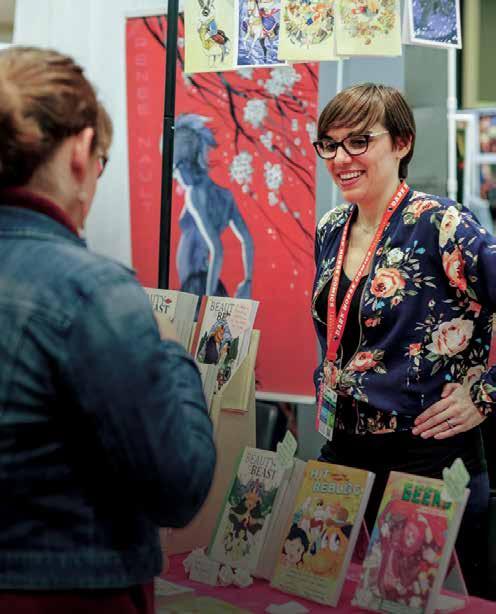 BY LINDSEY ANDERSON SGN
BY LINDSEY ANDERSON SGN
are
One such hero is Phill Wilson, an American activist fighting for the rights of Black LGBTQ+ HIV/AIDS survivors in the United States. In the early 1980s, he and his partner, Chris Brownlie, were both diagnosed with HIV. They watched as the US government cast AIDS victims aside, and noticed that most of the help that did come to the LGBTQ+ community was reserved for cis white men.
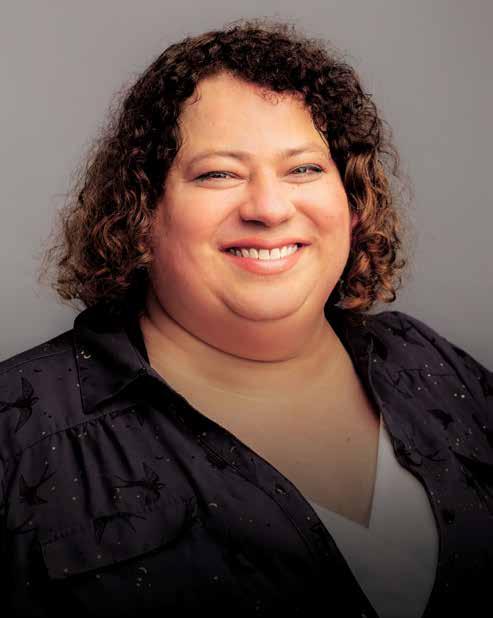
SEATTLE & THE PACIFIC NORTHWEST’S LGBTQIA+ NEWS & ENTERTAINMENT SOURCE SINCE 1974 ISSUE 4
FEBRUARY 23, 2024 VOLUME 52
FRIDAY
WRITER
STAFF
Black History Month concludes, we’d like to acknowledge that, while many of our modern achievements, rights, and victories are due to the hard work, bravery, and pride of Black Queer and Trans heroes, there
still countless people creating and shaping LGBTQ+ history today. Phill Wilson
BY CAMERON MARTINEZ SGN CONTRIBUTING WRITER As of Feb. 5, former SGN managing editor Renee Raketty is the paper’s new editor, replacing acting editor Benny Loy. “[During Loy’s editorship], she has filled critical functions, particularly during the SGN ’s ownership transition,” said publisher Mike Schultz in a message to the staff. “We’re grateful for the many hats Benny has had to wear, always with a smile and positive support, and we’re very happy she will stay with us as a contributor.” BY DANIEL LINDSLEY SGN STAFF WRITER One of the biggest geek gatherings in the Pacific Northwest is happening again next weekend, from the morning of Thursday, February 29 through the early evening of Sunday, March 3, at the Seattle Convention Center. As always, Emerald City Comic Con (ECCC) promises more Queer guests, panels, and events than a single journalist could possibly handle — and there are even more features planned for this year. SEE EDITOR PAGE 6 SEE ECCC PAGE 4 RENEE RAKETTY – PHOTO BY NATE GOWDY EMERALD CITY COMIC CON PHILL WILSON – COURTESY OF THE BLACK AIDS INSTITUTE Renee Raketty takes over as SGN editor Benny Loy steps down Community and inclusion: A priority and a passion at Emerald City Comic Con 2024 SEE LGBTQ BLACK HISTORY PAGE 7 LGBTQ BLACK HISTORY HEROES OF TODAY


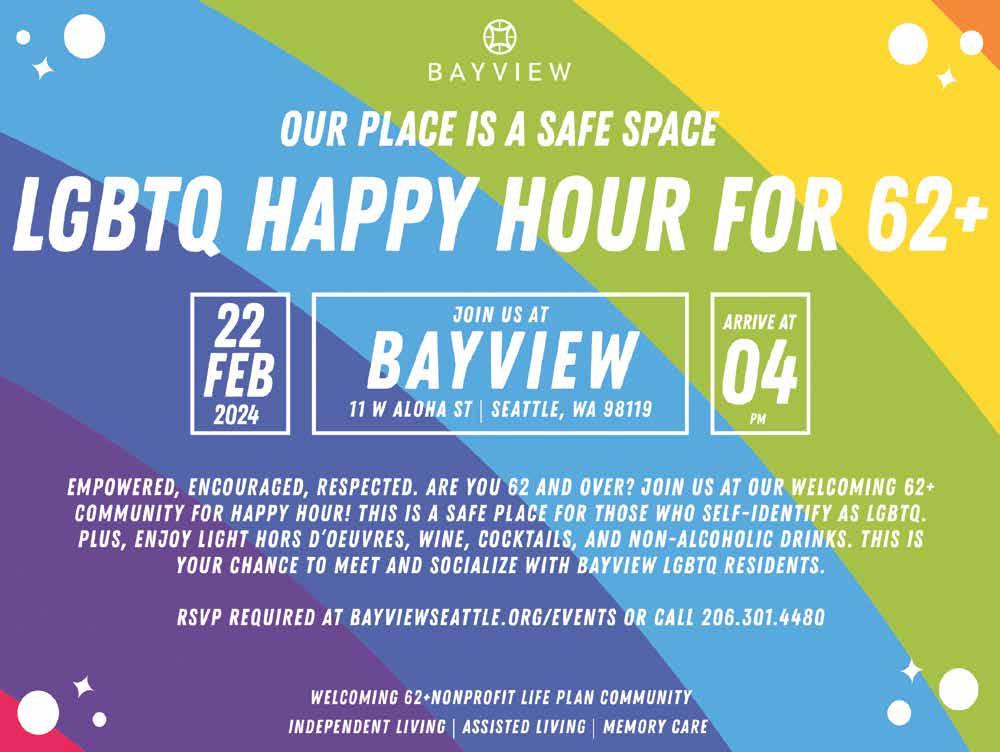
CELEBRATING 50 YEARS! FEBRUARY 23, 2024 2 SGN




Artificial insemination for Lesbians
by Marie Annaed
SEATTLE GAY NEWS VOLUME 6, ISSUE 4 MARCH 2, 1979
Artificial insemination of unmarried women has become a popular topic lately. Articles in the Seattle Sun and the Seattle Times, as well as a series in the P-I, have explored the spread and problems of artificial insemination (AI). And at least one local women’s bar has held public discussions on the subject.
But despite all this exposure, misconceptions about the controversial process still run rampant. Popular literature speaks about “factors that influence the sex of the infant.” And one local woman was heard to announce her belief that it is safe to “stick the semen in the refrigerator until use.” […]
Several local physicians currently perform AI on an office basis. For at least one, on First Hill, AI is a regular part of his practice. But most doctors are reluctant to publicize the operation to the general public: some persons and groups take violent exception to it.
The semen used in these operations is usually obtained from doctors or medical students, though, for a reduced fee, a woman can bring her own donor.



The first doctor’s appointment in the AI process includes a thorough gynecological exam and a review of the processes of impregnation and ovulation. The fee for this is fairly high. Subsequent appointments are monthly or twice monthly.
The First Hill physician mentioned above counseled and impregnated two openly gay women last year; neither reported any problem.
A woman who wants to become pregnant must learn to know when she is ovulating, [that] she is fertile. […]
Semen for artificial insemination is collected by masturbation, which may take place in an adjoining room in the physician’s office. The container, usually a glass jar, must be free of toxic chemicals, like cleaning agents. The donor must have been relatively chaste for one to seven days before insemination. Even wet dreams can
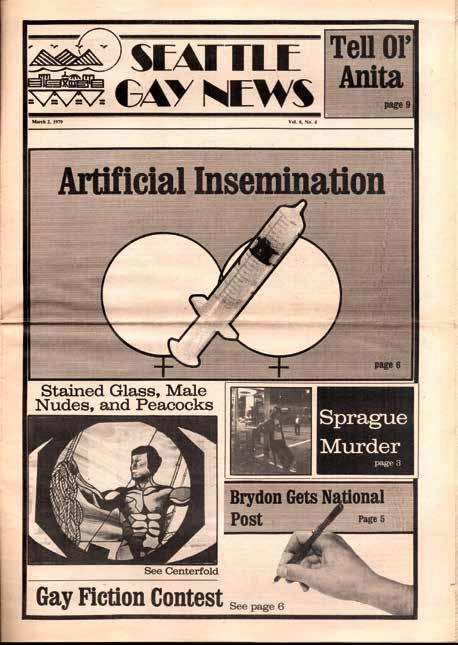
lessen the number of living sperm cells he has to give. The amount of fluid does not diminish with frequent sexual activity, just the number of live sperm cells. […]
One method of obtaining sperm used by an East [Coast] gay commune has been to have a sort of party. Men ejaculate into clean jars, the jars are poured together, and women who want children use this mixture. In this way the donor is anonymous, and has no legal responsibility. Seminal fluid will keep potent for three hours if left at room temperature.
Lesbians may wish to become parents for many reasons, and espouse a wide range of political motives for motherhood. But women who do not want to bear little males should take [heed]: there are no effective ways to affect the sex ratio. Forget those slickback books; they simply do not tell the truth. Those physicians who have declared that changing the acidity of the vagina (vinegar douche), warming the semen, or trying particular days of ovulation can affect the sex of an infant are just out to make money. According to contributors to the International Journal of Fertility and Fertility and Sterility, some of these methods may be harmful. After all, if these techniques worked, physicians would be using them en masse. […]
Methods of artificial insemination vary slightly with each clinic. Two main methods
are used: the cap method and simple insertion. Both of these systems can be used in a clinic, or, as many lesbians seem to prefer, at home. Two [practices] must be observed by either the professional or the dedicated amateur: don’t heat the semen, and don’t put it in the refrigerator. If there is to be any delay before using the sperm, it must be left at room temperature.
Testicles are not hanging outside the body for sheer decoration; Nature knows what she is doing. Warm testicles make for slow, unsuccessful sperm; warmed up seminal fluid may be defective. While the refrigerator is never the place for a bottle of sperm, a clinic can successfully freeze it. The process is involved, though, so don’t try it yourself. […]
Men donate sperm for as many reasons as women want children. Those gay men interested in carrying on their genes into the next generation will probably find that quite a few lesbians are willing to help them out — at least if the matter is kept anonymous. Lesbian women are now finding the courage to have the children they feel they can raise.
This article was edited for length. To view the article in full, visit https://issuu.com/sgn.org/docs/sgn_ march_2_1979_7f3ec0b5664f0c.
FEBRUARY 23, 2024 VISIT US ONLINE SGN.ORG SGN 3 SEATTLE NEWS REGIONAL NEWS NATIONAL/INTERNATIONAL NEWS OP-ED A&E FILM BOOKS ORIGINALLY SEATTLE GAY NEWS 509 10th Ave E Seattle, WA 98102 (206) 324-4297 info@sgn.org sgn.org Publisher Copy Editor Editor Advertising Manager Design / Production Staff Writers Social Media Team Photography Comics Contributing Writers National Advertising Rep. Mike Schultz Angela Cragin (2020 - 2023) George Bakan (1984 - 2020) Jim Tully (1974 - 1984) Richard Isaac Renee Raketty Maggie Bloodstone advertising@sgn.org (206) 751-7454 Mike Pham Lindsey Anderson · Sara Michelle Fetters Daniel Lindsley · Isabel Mata Lindsey Anderson · Cameron Martinez Matt Cyphert · SGN Staff Clar Hart @seattlegaynews @seattlegaynews_ SGN is published by Stratus Group LLC. © 2024. All Rights Reserved. Reprints by permission. Publication of names, photographs, or likeness of any person, organization, event or business in this publication cannot be taken as any indication of the sexual orientation of the person, organization, event or business. Opinions expressed in bylined articles, columns, and letters are those of the authors only and do not necessarily reflect the views of the staff or management of this paper. SGN welcomes unsolicited material, including letters to the editor, but reserves the right to edit or reject material. All rights revert to authors upon publication. We assume no liability for loss or damage of materials, solicited or not. We invite feedback, please write. Alice Bloch · Maggie Bloodstone Kylin Brown · Rhonda Brown · Sharon Cumberland Ian Crowley · Clar Hart · Benny Loy Kali Herbst Minino · Teddy MacQuarrie Cameron Martinez · Shelby Olson Rivendell Media (212) 242-6863 FOUNDED 1974 MEMBER FOLLOW OUR SOCIALS
IN THIS ISSUE 4 6 7 9 12 14 19
Community Tattoo Collective creates a culture of art and philanthropy
BY IAN CROWLEY SGN CONTRIBUTING WRITER
Art is often considered the final product of whatever method of creation the artist has chosen to engage in. To many though, it extends beyond the creation and the creator, to include the entire community the artist belongs to, especially in cities. Art cannot thrive without other people participating in it and helping in a myriad of ways to get it done.
Tattooing is no different. Every successful shop has a group of people whose patronage supports the artists. Beyond that, they often can band together to further help the community at large, independent of the art.
Electric Kitten (which received the SGN Best Tattoo Shop Award) understands this phenomenon intimately. Owner Robyn Emlen started a nonprofit in 2020 called the Community Tattoo Collective (CTC). Rachel J. Lieberman (who works as a booking manager for tattoo artists) became her colleague in the collective later that year. The two have been doing incredible work for the CTC, the artistic community, and Seattle at large for four years.
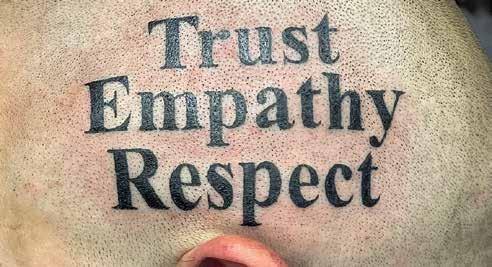
How the collective works
Every month, the CTC selects a new local nonprofit to donate to. Then, their crew (of around 50 artists and the company Coalition Tattoo Supply) donate as much as they want to any given charity each month. With no fixed donation amount, donors choose how much to give. Donations have ranged
from $50 to $300 or more. This month, the nonprofit recipient is the Urban League of Metropolitan Seattle.
The collective has raised an astounding $178,000 over its four years of operation, an impressive $50,700 of which was donated last year to the following organizations: Q Center, the Urban League of Metropolitan
Seattle, Girls on the Run Puget Sound, Real Rent Duwamish, Homies Helping Homies, Diversity Alliance Puget Sound, StolenYouth, Rainbow Center, Puget Soundkeeper, Old Dog Heaven, API Chaya, and Seattle T2P2. One hundred percent of the money donated goes directly to the charity.
Some artists who donate regularly include Adam Miller, New York [sic], Monica Amneus, Casey Buxton, Suzanna Fisher, Ashley June, Michael T. Gardner, Wil Spaedt, Nicole Roar, and Emlen herself.
The importance of community
When involving yourself in an artistic community it is important to see the needs of those you are creating art for, beyond that for art. This is especially important with regards to the charities chosen, as those affected often do not have their needs met by current legislation. Independent avenues of remedying these systems, such as artist-led nonprofits, are a powerful way of showing resistance. In this way, organizations like the Community Tattoo Collective solidify the ability of a community to take care of itself.
Kristina Rogers, event vice president for ReedPop’s comics portfolio, spoke with me over Zoom to help break down some of the most exciting bits of programming. But first, we talked about ECCC’s history, and her own history with it.
As a former Seattle resident and selfdescribed “tried-and-true nerd,” Rogers has been working with ECCC for 16 years. She started as a volunteer, after the owners of her favorite comic book shop asked for some help with registration. By her account, her role at the organization sort of snowballed from there.
“I was like, ‘Man, this was really fun,’” she recalled. “‘And I think it could be a lot better and more organized. So can I do this again? Could I work on it for longer?’”
For some perspective, this was back in the late 2000s, either a year before the release of the first Iron Man movie or shortly after. Iron Man was hardly the first superhero film to achieve box office success, but it was the beginning of the “Marvel Cinematic Universe” as we know it today.
Since then, ECCC has expanded from just comics to a wide range of media, and from mere thousands to tens of thousands of attendees, outgrowing two of its venues in the process. Yet diversity, equity, and inclusion, Rogers said, has remained not only a high priority since day one but also a passion.
“I really love, first and foremost, creating a space for those who have been othered,” Rogers said.
And ReedPop itself seems to be one such space. Rogers described it as “a collection of diverse weirdos in the event producing business.” Laughing, she added, “That’s how my team prefers to be pitched, actually.”
Even as a woman who identifies as Queer, Rogers said she has “never felt limited in any way, not prior to the acquisition and certainly not now with ReedPop.”
Creating community spaces
There are many ways to approach running an inclusive, safe convention at such a large scale, but bringing in a trusted local organization for support is becoming more and more common. For the last few years, ReedPop has partnered with Free2Luv, a local youth advocacy and anti-bullying group, to run ECCC’s annual Pride Lounge.
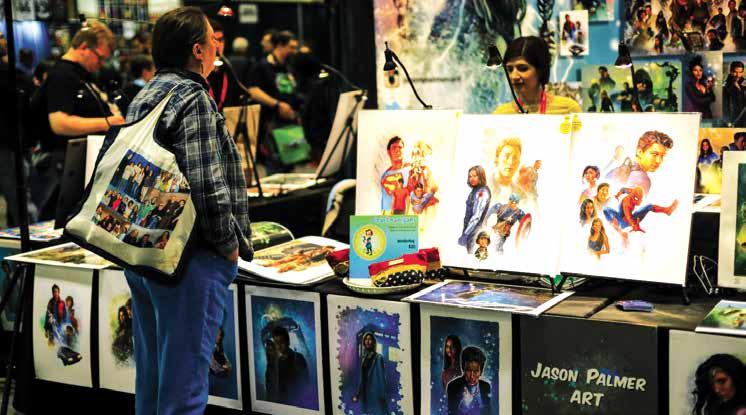
Queer con-goers can expect to have a “chill space” with bean bags, tables for playing board games or collaborating on colorful posters, and a spot for taking pictures with friends or the cosplayers who stop by. This year, the Pride Lounge will also host workshops for making friendship bracelets, a dedicated “Gayme Night” with prizes, and Drag Queen Bingo with Seattle queen Ruby Bouché.
Inclusion goes far beyond one room, of course. This year’s most overtly Queeroriented panels include “Queer Is the New Normal in Fantasy,” “Reclaiming Queer History through Comics,” and “Superqueer: A Discussion on LGBTQ+ Representation in Superhero Media.”
Even the less overt panels have been pretty diverse over the last few years, whether they’re about something serious, like industry discrimination, or more fun topics. By Rogers’s account, a lot of that diversity is grassroots, since many are organized by members outside ReedPop.
Yet Rogers also said her team is “always pushing” for more, constantly asking themselves, “How are we making sure that no matter who you are, you’re walking into the show and you’re seeing yourself in it?”
“Weaving inclusivity through everything
we do” has been one of ECCC’s biggest achievements, Rogers said. And ReedPop measures its success and plans future content with the help of community feedback.
“I live and die by our post-show survey,” Rogers said. “If you’ve purchased a ticket to our show, you get an email inviting you to tell us what you think. We [get] a really strong response. There’s a lot of people who fill that out, a lot of opinions.”
“And I do read every single one,” she added. “It takes a bottle of wine and about a week.”
Broader landscape
Beyond comics and geekdom, ReedPop also keeps a close eye on the broader cultural landscape, like trends on social media, shifts in national conversations, and the like.
For example, after the hardest years of the COVID-19 pandemic, “everybody is way more passionate about spending time together and meeting new people than they are about sitting in a room and watching five people talk,” Rogers said.
That’s why ECCC is rolling out “The Tavern,” a space dedicated to sitting down and meeting fellow fans. Its three rooms each bear its own name and theme (like the “Pickled Pixie”), including an all-ages
gaming space (hosted by the Alexandria RPG Library) and a 21+ area with a bar. There are also a few workshops and meetups spread out over the weekend.
LARPing made its debut at ECCC last year, with battle games and other activities led by one of the local Amtgard chapters. This year Amtgard is back in an even bigger way, Rogers said, with more space to skirmish and lead workshops of its own.
As for future conventions, Rogers said the ECCC team’s “biggest push” has been for more guests and companies from the Asia-Pacific region, and also more Black representation, which would mean bringing in local organizations.
“We work with a couple of great groups out of Chicago and New York.... We’re always happy to work with more, just to make sure all of our spaces are fully represented,” Rogers said.
To check out the panels, guests, events, exhibitors, and other features of this year’s Emerald City Comic Con, visit https://www.emeraldcitycomiccon.com. Individual day passes and four-day passes are available.
CELEBRATING 50 YEARS! FEBRUARY 23, 2024 4 SGN SEATTLE NEWS
ART BY CASEY BUXTON TO BENEFIT THE RAINBOW CENTER SERVING THE LGBTQ2SA COMMUNITY IN SOUTH PUGET SOUND – COURTESY PHOTO
ECCC CONTINUED FROM COVER
EMERALD CITY COMIC CON

FEBRUARY 23, 2024 VISIT US ONLINE SGN.ORG SGN 5
REGIONAL NEWS

Loy has been with the SGN since 2022, when she encountered the paper’s booth at that year’s Pride in the Park event and was encouraged by then-editor A.V. Eichenbaum to join the team.
“For one thing, I wanted to write, but for another, I really like doing things that I think are going to benefit my community,” Loy said. “So, I saw the SGN as an opportunity to do so.”
She began as a contributing writer and then transitioned to acting editor a few months before the paper’s transfer from former publisher Angela Cragin to Schultz in late 2023.
In terms of her writing for the paper, so far Loy is most proud of the story she wrote about her trip to the Washington Coast in collaboration with her wife Lauren Vasatka (https://shorturl.at/tyJNU). Her proudest achievement during her time as an editor was keeping the SGN alive to its 50th year.
“My primary goal was to keep it going, at least until we hit our 50th, because it would be the biggest shame if we fell apart at our 49th,” Loy said. “Also, [I wanted to] try to keep the amazing team we had together.”
Now that Loy is stepping down and becoming a contributor, she hopes to spend more time with her wife and many dogs.
Renee Raketty
Raketty has been in the journalism field since she wrote for the student paper at Newport High School in Bellevue. It was also
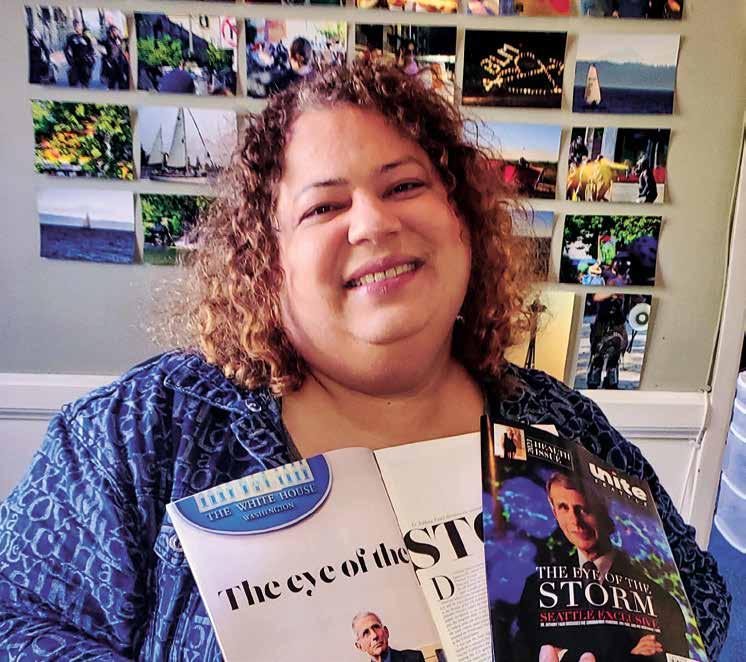
“I think that this is an important year for someone with [such] historical knowledge, especially because it’s our 50th anniversary. I’m someone who is deeply [familiar with] the people who came before us who really put their blood, sweat, and tears into this paper.”
around that time that she came out to her family and felt empowered to get involved with Seattle’s LGBTQ+ community.
Raketty originally joined the SGN in October of 2001 as a writer, becoming managing editor in August of 2005. She has also written for Seattle Gay Standard, Capitol Hill Seattle Blog, Tacoma Weekly,
Unite Seattle Magazine, and various other publications.
On top of being the SGN ’s newest editor, she is also a field producer for Malcontent News and a member of the Trans Journalists Association, NLGJA: The Association of LGBTQ Journalists, and the Society of Professional Journalists.
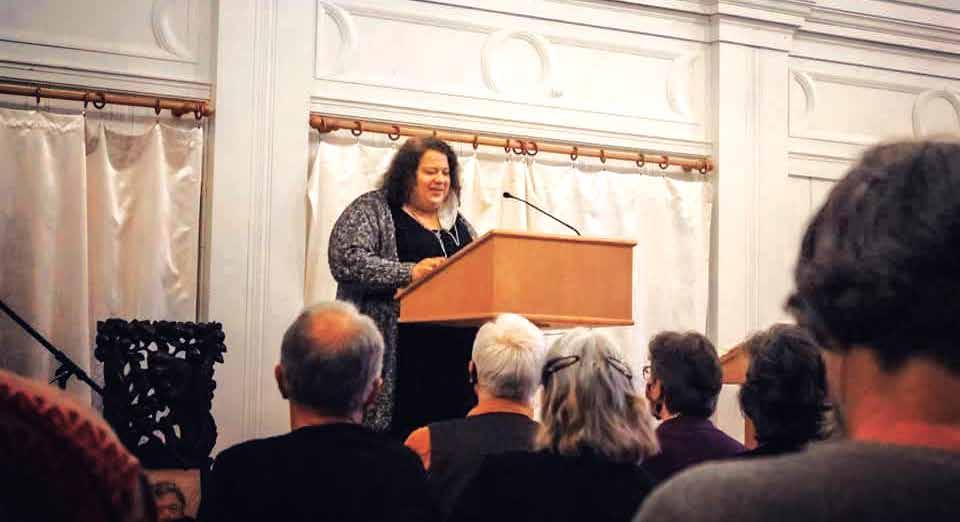
In terms of Raketty’s accomplishments within the field, she was integral in the evolution of SGN ’s production process from a physical cut-and-paste method to utilizing digital technology in the early 2000s, and has also interviewed Rosa Parks and other notable figures. Outside journalism, she recently was part of successful lawsuit against the Seattle Police Department, and has contributed to the fight for equality for LGBTQ+ people.
“Mike asked me [to be an editor] because of my previous experience working as a managing editor and my knowledge of the paper,” Raketty said. “I think that this is an important year for someone with [such] historical knowledge, especially because it’s our 50th anniversary. I’m someone who is deeply [familiar with] the people who came before us who really put their blood, sweat, and tears into this paper.”
As editor, she will strive to maintain the SGN ’s position as a voice for the Queer community and diligent watchdog regarding important issues.
“It’s really great to be back at the paper,” Raketty said, “especially as someone who is Transgender, in a position where I can ensure that the community stands together as the Transgender community faces the same vitriol and onslaught that we faced in the ’90s and 2000s. I think it will be helpful to have someone who has that perspective providing editorial oversight.”
Thank you to Benny and Renee!
CELEBRATING 50 YEARS! FEBRUARY 23, 2024 6 SGN
Benny Loy
EDITOR CONTINUED FROM COVER
RENEE AT THE SGN OFFICE – COURTESY PHOTO
RENEE SPEAKS AT A MEMORIAL FOR SGN PUBLISHER GEORGE BAKAN IN 2021 – PHOTO BY KYLIN BROWN
BENNY LOY – PHOTO BY NATE GOWDY
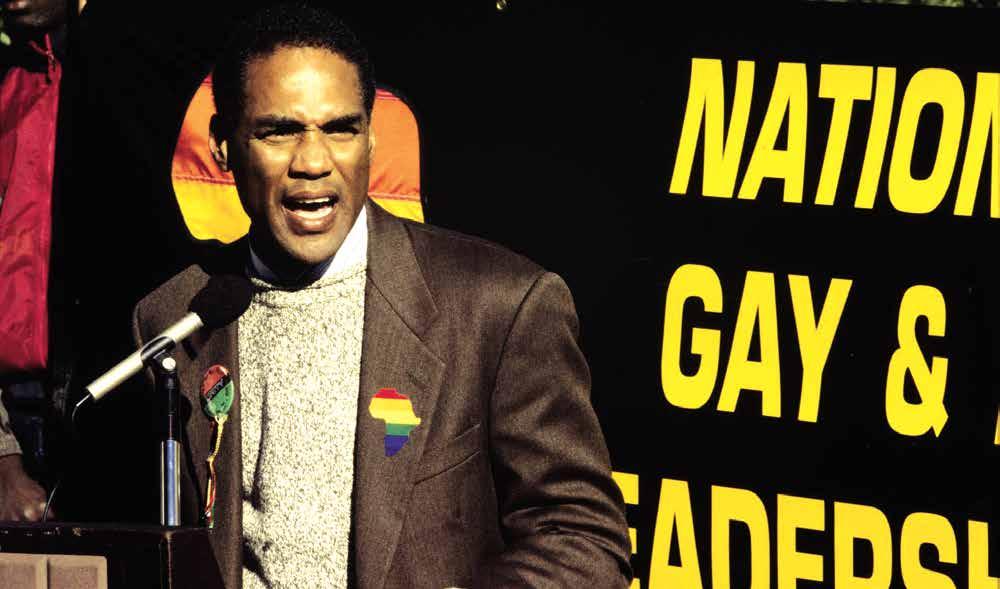
LGBTQ BLACK HISTORY
CONTINUED FROM COVER
Following the death of his partner in 1989, Wilson harnessed his grief and turned it into action. He has used his platform for the last 40 years to speak out and educate the American people about HIV/AIDS.
He cofounded the Chris Brownlie Hospice in LA for people living with HIV/ AIDS. Having already served as the director of policy and planning for AIDS Project Los Angeles, Wilson decided to take on a leadership position with the city’s HIV Health Commission. He founded the Black AIDS Institute in 1999 and was inducted into the Chicago Gay and Lesbian Hall of Fame.
In 2010, President Barack Obama appointed Wilson the co-chair of the disparities subcommittee of the President’s Advisory Council on HIV/AIDS.
Andrea Jenkins
Andrea Jenkins is a writer, activist, and politician. In 2017, she was the first Black and openly Transgender woman elected to public office in the United States after being voted onto the Minneapolis City Council with 70% of the vote. Following her first term, Jenkins was elected city council president, serving from 2022 to 2024. “I believe that when we center the most marginalized folks in our community, then everybody benefits,” she said.
Before her election, Jenkins worked as a staff member for the council for 12 years while also splitting her time as a curator for the Transgender Oral History Project at the University of Minnesota.
Jenkins grew up in a working-class community in Chicago with a single mother who valued hard work and education. She moved to Minneapolis in 1979 to begin her studies at the University of Minnesota.
Throughout her twenties, Jenkins explored her identity, coming out as Gay, getting married, having a child, and then getting divorced. At 30, she came out as Transgender, returned to school, and finished her bachelor’s degree.
Jenkins also helped to develop the Trans United Fund, a political action group to help elect Transgender candidates to local offices. While in office, Jenkins served as
the chair of the Race Equity Subcommittee and helped create the Racial Equity Community Advisory Committee for city residents. Jenkins represented the district where George Floyd was killed by police in 2020; following his death, she advocated for the abolition of the police.
“Black Trans women are brilliant and are qualified to contribute to our culture and society, and in more ways than just dancing on our stages,” she said.
Lori Lightfoot
Lori Lightfoot was the first Black and openly Lesbian woman to serve as the mayor of a major US city, and the first Black woman to serve as the mayor of Chicago, after being elected in 2019. Most did not expect Lightfoot to win her campaign for mayor, but in an upset, she won the primary runoff.
After graduating from the University of Michigan, Lightfoot worked as a congressional assistant before she decided to return to law school. While a law student, she clerked for Michigan Supreme Court Justice Charles Levin.
Following her graduation, Lightfoot worked as an assistant US attorney until 2002, when she began working for the Chicago Police Department Office of Professional Standards. While holding this position, she investigated cases of police misconduct. She made national headlines when she opposed the department’s decision not to terminate an officer after video evidence showed he unjustly shot an unarmed man.
During her time as mayor, Lightfoot focused on building affordable housing, raising the minimum wage, and repairing dilapidated areas of the city. After the murder of George Floyd in 2020, Lightfoot decided to remove a statue of Christopher Columbus from Grant Park. During the consequential Black Lives Matter protests, she spoke out against police unions, which she believed were the biggest obstacle to reform.
History is being written every day, often by unrecognized and unsung heroes. As Black History Month wraps up, we recognize the trailblazers and change makers who came before us, and the ones who stand in front of us today as leaders, activists, and community members.
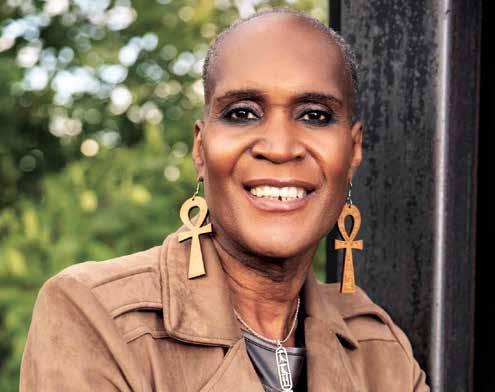
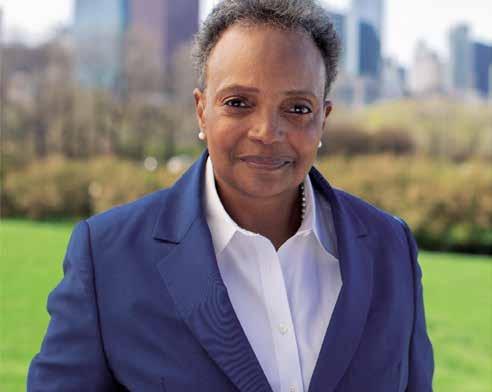
FEBRUARY 23, 2024 VISIT US ONLINE SGN.ORG SGN 7
NATIONAL NEWS
PHOTOGRAPHIC SLIDE OF PHILL WILSON SPEAKING, 1995
– COLLECTION OF THE SMITHSONIAN NATIONAL MUSEUM OF AFRICAN AMERICAN HISTORY AND CULTURE, GIFT OF RON SIMMONS
LORI LIGHTFOOT – COURTESY PHOTO
ANDREA JENKINS – BROOKE ROSS PHOTOGRAPHY
NATIONAL/INTERNATIONAL NEWS
National news highlights
BY TEDDY MACQUARRIE SGN CONTRIBUTING WRITER
Transgender activists stage die-ins to protest Florida driver’s license rules
Transgender activists in Florida held die-in protests Friday morning at driver’s licenses offices around the state, including Miami, Orlando, Tampa, Jacksonville, Tallahassee, and Gainesville.. Dozens showed up draped in Transgender flags or orange road-safe vests and lay down in lobbies and offices, drawing attention to the state’s latest erasure of Trans identity.
The die-ins took place following a controversial decision by Florida Gov. Ron DeSantis’ administration to criminalize changing one’s gender on a license to reflect a transition in gender identity.
New York archdiocese condemns funeral of Trans activist
The Roman Catholic Archdiocese of New York condemned the funeral of Cecilia Gentili, which was held in St. Patrick’s Cathedral in Manhattan and drew a large audience on Thursday. Gentili was known as a leading advocate for the Trans community, sex workers, and people with HIV. A post on her Instagram account announced her death on February 6 at the age of 52.
In a written statement released Saturday, the Rev. Enrique Salvo, pastor of St. Patrick’s, thanked people he said had informed the church that they “share our outrage over the scandalous behavior” at the funeral.
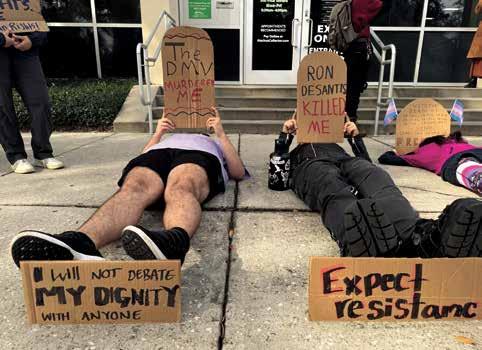
“The Cathedral only knew that family and friends were requesting a funeral Mass for a Catholic, and had no idea our welcome and prayer would be degraded in such a sacrilegious and deceptive way.”
A former sex worker who suffered addiction and was jailed at Rikers Island, Gentili became a Transgender health program coordinator, a nonprofit policy director for an established Gay men’s health organization (GMHC), and a lobbyist for health equality and antidiscrimination legislation,
among other advocacy work.
Gentili founded the COIN Clinic, short for Cecilia’s Occupational Inclusion Network, a free health program for sex workers through the Callen-Lorde community health organization in New York.
Tennessee Senate passes bill allowing marriage discrimination against same-sex couples
The Tennessee State Senate has passed a bill potentially allowing individuals to
International news highlights
BY TEDDY MACQUARRIE SGN CONTRIBUTING WRITER
Greece becomes first Orthodox country to legalize marriage equality
The Greek parliament became the first Orthodox country to legalize marriage equality in a rare show of bipartisan cooperation. The measure was advanced by Prime Minister Kyriakos Mitsotakis and was largely opposed by his own Conservative Party.
The February 15 vote was 176 members voting for, 76 against, and two abstaining.
Following the vote, Mitsotakis said in a post on X, formerly Twitter, that Greece “is proud to become the 16th [European Union] country to legislate marriage equality.” He added, “This is a milestone for human rights, reflecting today’s Greece: a progressive, and democratic country, passionately committed to European values.”
The law allows people in same-sex marriages to adopt children and for both parents to be recognized, but Greek law still disallows same-sex couples from surrogacy.
Ahead of the vote, church leaders wrote a letter to Parliament saying that legalizing same-sex marriage would let children “be parented by same-sex couples and grow up without a father or mother in an environment of confusing gender roles.”
More than 80% of Greeks belong to the church, but with polls indicating that the majority support marriage equality, the church’s stance does not seem to be popular.
Top court in St. Vincent and the Grenadines upholds ban on Gay sex
A top court in St Vincent and the Grenadines has upheld laws that criminalize Gay sex, in a blow to activists who have
refuse to officiate marriages based on their personal beliefs, including objections to same-sex weddings.
The legislation, Senate Bill 596, declares that “a person shall not be required to solemnize a marriage if the person has an objection to solemnizing the marriage based on the person’s conscience or religious beliefs.”
Critics argue that this legislation could lead to broader discrimination, particularly affecting same-sex and interracial couples.
The bill, which passed the House last year, now goes to the state’s Republican Gov. Bill Lee, who will likely sign it.
Idaho asks SCOTUS to allow state to enforce gender-affirming care ban
Idaho officials asked the Supreme Court to let the state enforce a strict ban on gender-affirming treatments for minors in an emergency request made public Monday by one of the groups involved in the case.
The law, signed by Republican Gov. Brad Little last year, makes it a felony for doctors to provide medical treatment to Transgender minors, such as puberty-blocking drugs, hormone therapy and certain surgeries. It also authorizes up to $5,000 in fines against medical professionals who provide that care.
A US District Court in Idaho temporarily blocked the law from taking effect late last year while the underlying case continues in federal court. The 9th Circuit Court of Appeals upheld that decision in January.
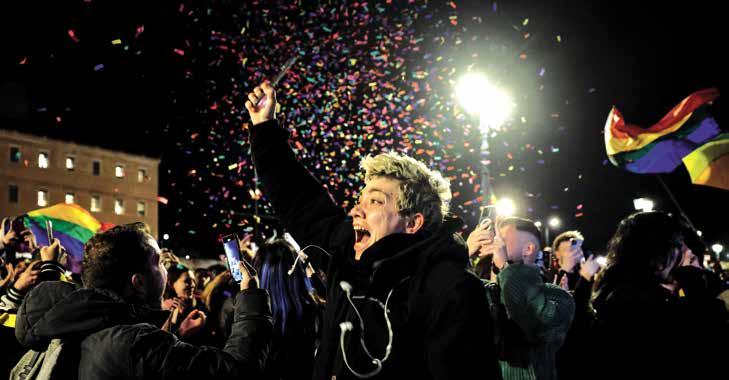
long decried the violence the Queer community has faced on the conservative Caribbean archipelago.
The ruling on Friday by St. Vincent’s high court stems from a 2019 case filed by two Gay men from St. Vincent who live in the UK and US. They sought to strike down colonial-era laws that call for ten years in prison for anal intercourse and five years for “gross indecency” with another person of the same sex.
It was not immediately clear if anyone planned to appeal the ruling.
While the laws are rarely invoked in St. Vincent and the Grenadines, activists say they help legitimize physical and verbal abuse against the Gay community in the small island nation of some 100,000 people.
Last year, a Human Rights Watch report noted multiple instances of abuse and discrimination against Gay people there, from the case of a teenage student having his arm broken to a man being hit in the head with a bottle, causing permanent brain damage.
The nation’s prime minister, Ralph Gonsalves, has previously decried discrimination against Gay people.
Houthi court sentences 13 men to public execution for Gay sex A Houthi-controlled provincial court in Yemen handed down death sentences to 13 men found guilty of engaging in same-sex sexual relations, according to the Agence France-Presse. Three other
men remain in jail, and another 35 have been arrested on similar charges in the province of Ibb.
The Houthis are an Iranian-proxy rebel group who control large parts of the country as they fight the Yemeni government.
Human rights groups decried the trials and sentences, saying acts of abuse have increased with the recent attacks on international shipping. Critics expressed skepticism about the group’s stated goal of striking a blow against Israel and its dependency on trade transiting the region.
It is unclear if or when the executions will take place. Shooting, stoning, hanging, and beheading are all forms of extrajudicial execution employed in Yemen.
CELEBRATING 50 YEARS! FEBRUARY 23, 2024 8 SGN
FLORIDA – COURTESY OF HRC
GREECE – PHOTO BY LOUISA GOULIAMAKI / REUTERS
Rediscovering romance in the age of true-crime obsession
Does anyone else remember when parents and teachers everywhere were convinced that video games were turning kids violent, aggressive, and antisocial? It feels like some strange fever dream from the early 2000s, but it’s stuck with me.
Now, as I scroll through Netflix, I’m blown away by the sheer number of true-crime, horror, and action offerings (or a mix of all of them). Social media bombards me with reminders of how obsessed people are with the true-crime genre in particular, regardless of its potential negative impact on mental health.
It makes me wonder: When did we stop worrying about how consuming this type of entertainment could hurt us in the long run?
Last year, Wired published an article stating that research has shown that consuming crime news and related media can lead to outsized fears of becoming a victim, and “for those who are survivors of violence, the glut of content can be a lot to take.”
This hits home for me. I can’t bring myself to watch anything involving brutal murders, because, frankly, real life is scary enough.
Instead, I gravitate toward my favorite genre: the romantic comedy. It’s having a moment in pop culture, with big hits like Anyone But You, Upgraded, and No Hard Feelings, and it’s never been more important.
First off, romantic comedies provide a lighthearted and uplifting escape from reality. In a world that often feels overwhelming or stressful, diving into the whimsical and romantic narratives of these films offers a much-needed break. Unlike the dark and intense subject matter of true crime and horror, rom-coms offer hope, joy, and optimism. They celebrate love, friendship, and the triumph of the human spirit, giving viewers comfort and reassurance.
Romantic comedies also stir up a range of positive emotions, something that’s hard to find after binge-watching the news. From laughter and amusement to warmth and nostalgia, these films lift spirits and brighten even the gloomiest days. The humor, wit, and charm of rom-coms can bring a smile to anyone’s face and foster a sense of connection.
But my favorite thing about them is how they foster empathy and emotional connection. By showcasing relatable characters and universal themes of love, heartbreak, and redemption, these films invite viewers to empathize with others’ experiences and struggles. This emotional resonance creates intimacy and leaves a lasting impression. As Brené Brown said, “Connection is why we’re here. We are hardwired to connect with others; it’s what gives purpose and meaning to our lives, and without it, there is suffering.”
BY ISABEL MATA SGN STAFF WRITER
Ask Izzy is an advice column about relationships, mental health, and sexuality. Written by Isabel Mata — a Seattle-based lifestyle writer, podcast host, and mental health advocate — Ask Izzy offers tangible expert advice so all readers can have stronger relationships, better sex, and healthier mindsets. Submit your question today by filling out a form at https://www.surveymonkey. com/r/KLKJ6TW.
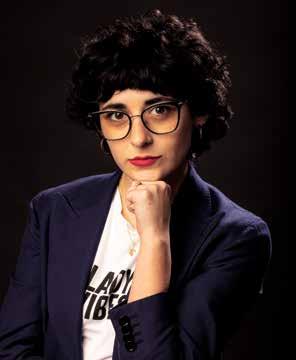

Social media bombards me with reminders of how obsessed people are with the true-crime genre in particular, regardless of its potential negative impact on mental health. It makes me wonder: When did we stop worrying about how consuming this type of entertainment could hurt us in the long run?
And in my opinion, there’s no better way to connect than by watching extremely beautiful people fall in love, break up, and come back together. While true crime may
offer intrigue and suspense, romantic comedies provide a much-needed dose of warmth, humor, and optimism. By choosing to watch one, viewers can escape into a world of love,
ANYONE BUT YOU – COLUMBIA PICTURES

laughter, and happily-ever-afters, reaffirming their faith in the power of love and the inherent goodness of humanity.
FEBRUARY 23, 2024 VISIT US ONLINE SGN.ORG SGN 9
OP-ED
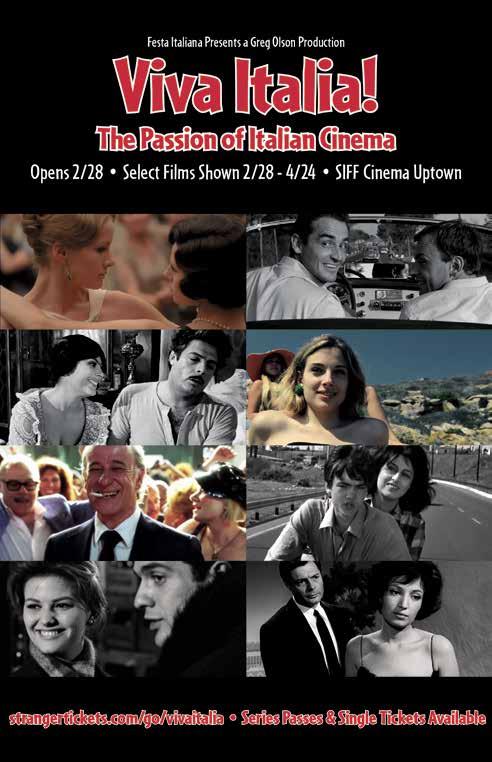
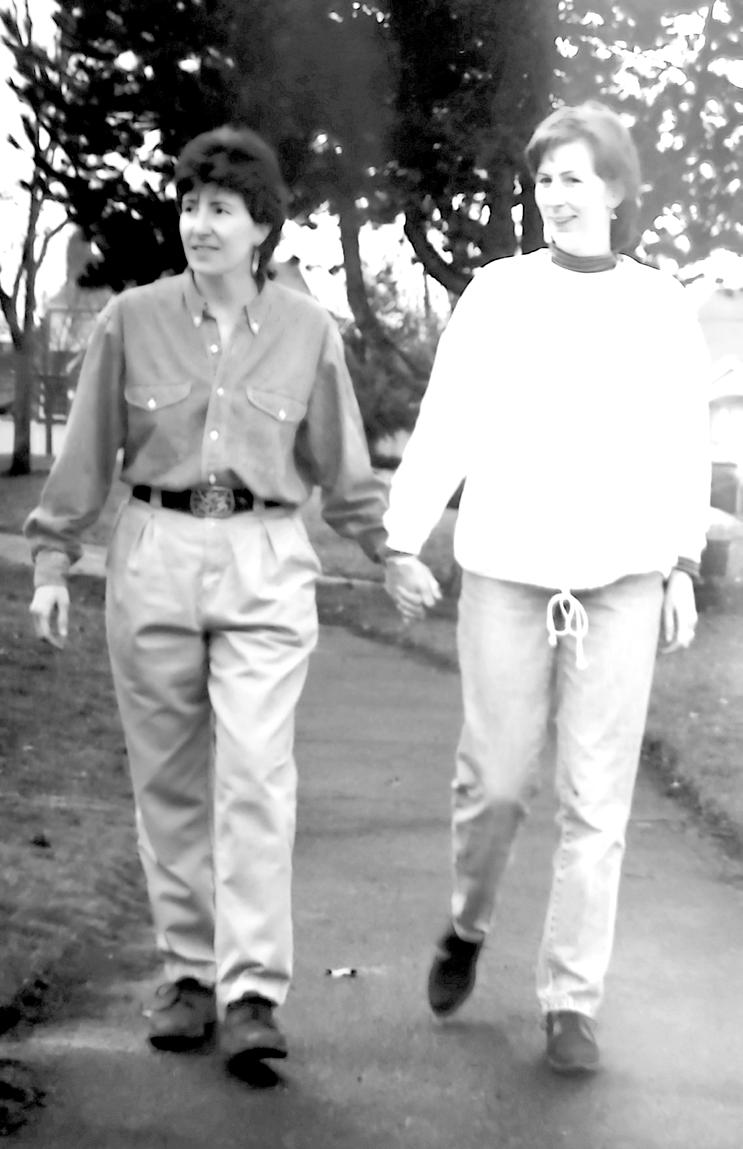



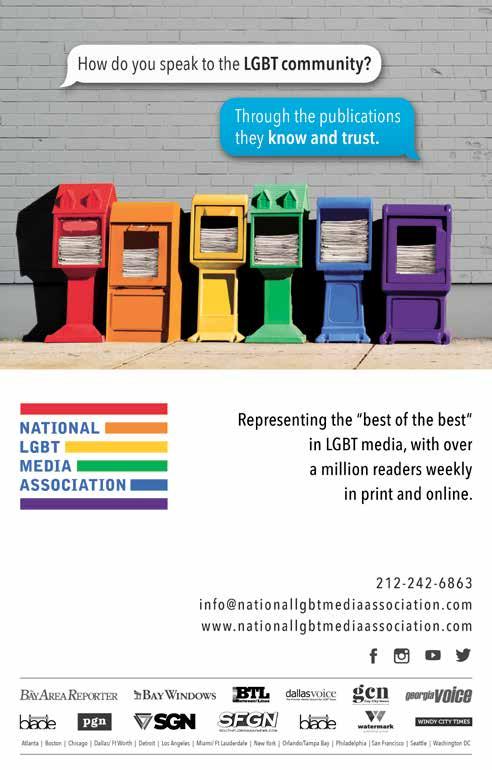
CELEBRATING 50 YEARS! FEBRUARY 23, 2024 10 SGN SEATTLE & THE PACIFIC NORTHWEST’S LGBTQIA+ NEWS & ENTERTAINMENT SOURCE SGN.ORG

FEBRUARY 23, 2024 VISIT US ONLINE SGN.ORG SGN 11
ARTS & ENTERTAINMENT
Emily Stranger and producer 4sia release new single, “Erase Me”
 BY IAN CROWLEY SGN CONTRIBUTING WRITER
BY IAN CROWLEY SGN CONTRIBUTING WRITER
Local Queer independent electronic musical artist Emily Stranger is gearing up to release her single “Erase Me” (produced by 4sia) on February 23. The track is an emotional house banger that simultaneously makes one want to dance and also feel contemplative and reflective in a way only great narrative songs can.
The artist has been going by the Emily Stranger project name for a while, since 2015. The producer of the track, 4sia, a Queer artist from the Bay Area, has been making music since she was in middle school, also in 2015. The two found each other after 4sia saw a cover of Ariana Grande that Emily had posted. The two were excited to work together, and the song is a result of that collaboration.
The song
The song opens with a restrained beat, creating emphasis on the vocals. The soft electric piano chords and washes of reverb reflect and accompany the lyrics, which allude to a deteriorating relationship. Emily’s dreamy vocals mesh perfectly with the elegant and hard-hitting house beat, which ramps up with percussion, intensifying until it drops, bringing in a thumping and cathartic chorus.
The second verse dives more into the specifics of the story. Lyrics like “I feel like I’m pushing my luck when I ask you for something” speak to the aforementioned breaking down of the partnership. As the narrative builds, added instrumentation increases the tension, perfectly setting up the bridge, which falls back into just piano and vocals, as Emily repeats the phrase “erase me.” This all leads to a beautiful climax, diving right back into that pulsating chorus, even more lush and huge than before.
“Erase Me” is an incredibly strong emotional house banger that really makes the listener feel. The lyrics are evocative and developed, painting a complete picture for the narrator’s state of mind. It leaves room for interpretation and imagination, while still delivering a satisfying narrative. This accompanied by the instrumental,
which knows exactly when to hold back and when to hit full force, paves the way for a truly dynamic listening experience.
Collaboration
4sia originally wrote the first verse, before Emily took over and wrote the second one onward. The collaboration on the lyrics is seamless, like one person was writing. The two said they leaned into shared experiences and emotions, which really shines through in the writing.
Emily said finishing the song felt like
“a little bit of personal growth.” Recording a track entirely remotely with a producer states away was something new to her, not to mention doing so without a studio companion. She rose to these challenges, though, and completed it long-distance with 4sia, sending demos back and forth until they got the perfect takes.
For 4sia, it also felt like a journey. This is the first house song she’s produced, so she also found herself in unfamiliar territory. Both teased the new track as something very different from their usual production.

In the future
While Emily has been taking a bit of a break from touring to focus on writing and recording new material, she does have an upcoming show at Real Art in Tacoma on March 26. As for 4sia, she has a music video coming out in a few months.
Stay tuned for what else these two have got going on, and on February 23, stream “Erase Me” by Emily Stranger (produced by 4sia) wherever you get your music!

CELEBRATING 50 YEARS! FEBRUARY 23, 2024 12 SGN
EMILY STRANGER (L) AND 4SIA (R) – COURTESY OF THE ARTISTS
ARTS & ENTERTAINMENT
Spirits fly high with the Emerald City Fliers at Mardi Gras extravaganza



 BY SHELBY OLSON SGN CONTRIBUTING WRITER
BY SHELBY OLSON SGN CONTRIBUTING WRITER
At the Mardi Gras Spectacular debut on February 9, the Emerald City Trapeze Arts venue seemed like a large warehouse or barn, its vaulted ceilings made up of dozens of wooden beams, clearly engineered with aerial activities in mind. Amid the twinkling lights and gentle bustle, every corner below was decorated with an assemblage of esoteric-meets-Mardi Gras: curious potion bottles, glittering skulls, and festive masks. Adults of all ages filled the floor seating and twin balcony spaces.
Then the lights dimmed, and out stepped our host, the captivating Madame Mars. The elegant guide was played by none other than Adra Boo, vocalist and co-director of PrideFest 2021. She engaged the crowd with quips about the end of the workday, and in true Mardi Gras fashion, centered our focus on the spirit of indulgence. For the duration of the show, she introduced each act with a tarot card that corresponded with its theme.
The pacing was strategic, starting slow and sexy, with an aerial-straps burlesque by the devilish Oroki, followed by aerial hoop, pole, and floor performances that ramped up toward the highest-energy act of the first half, a sizzling dance routine by Koach Giggz and Krew. A broad range of talent also took part, including a romantic acrobatic sequence of pretzel-like proportions by Duo Rose, a bootylicious number by local drag queens Beau Degas and Rowan Ruthless, and a heady celebration of Trans joy, Queer intimacy, and a sacred-masculinity act by the leather-clad Moonyeka and the House of Kilig.
Madame Mars then delivered us to the break with a vocal performance of her own, ushering many of the participants back onto the floor, as well as a giant litup snake, puppeteered by several crew members. She encouraged the audience to stand up and join the snake-led promenade around the room, in which almost everyone participated. The energy bubbled over, in perfect anticipation of the exhilarating second half to follow. (One couldn’t help envying the following night’s show, which was slated to end with a dance party.)
The Emerald City Fliers concluded the
extravaganza with an exhilarating bang in a nail-biting sequence of acrobatics, flinging themselves across the room, individually and sometimes in pairs, eliciting hysterical delight from the crowd, each receiving their own special spotlight and appreciation. The trapeze artists utilized the entirety of the space, both in the air and running perpendicularly along the balconies, where part of the audience was close to the performers. It was clear the architecture of the space was utterly unique — as one of the troupe members would later attest, “Nowhere else in the world can you [sit] at flying height.”
Though the tenets of Mardi Gras were strong tonight, it was clear that the winning theme of the evening was the unshakeable sense of community: from the celebration of individual performers’ milestones, like Duo Rose’s first child and trapeze artist Lynn Treadwell’s 51st birthday, to the tightknit, supportive energy of the group.
Emily Perrier, choreographer of the Fliers’ act, praised the collaborative nature of the production, remarking how rewarding it was to make tickets donation-based and “open it up to the community.” She said afterward, “You could feel the energy of all the friends and families, and maybe people who wouldn’t have come otherwise.” Perrier travels the world to perform, but Seattle continues to be a favorite, both for the uniqueness of the space and the “open-mindedness and the acceptance of the people here… They are just so welcoming.”
With shows like this, aerial arts seem to have a promising horizon. Many of tonight’s performers learned as adults. One was on a plane (can it get any more aerial?) when she first saw an advertisement for flying trapeze classes, and instantly wanted to try.
The mere act of exposure to these arts goes above and beyond in bringing more people in. “The more that people become aware of it,” Perrier said, “[the more they] fall in love with it.”
Show co-director Caela Bailey hopes that in the wake of this production, more people will want to learn circus arts. Bailey and co-director The Shanghai Pearl — whom Moonyeka dubbed “a goddamn legend” in the burlesque world — achieved their collaborative vision for tonight’s broad showcasing of talent. Whatever they bring to the stage next is sure to dazzle and inspire.
FEBRUARY 23, 2024 VISIT US ONLINE SGN.ORG SGN 13
FROM TOP: LYNN TREADWELL, ADRA BOO, CO-DIRECTORS THE SHANGHAI PEARL & CAELA BAILEY, THE EMERALD CITY FLIERS – COURTESY OF DANTE MORENO
Unforgettables: Cinematic milestones with Sara Michelle
Six decades later, Seven Days in May remains a powerfully prescient political thriller
 BY SARA MICHELLE FETTERS SGN STAFF WRITER
BY SARA MICHELLE FETTERS SGN STAFF WRITER
Of the seven motion pictures Burt Lancaster and Kirk Douglas starred in together during their careers, 1964’s Seven Days in May is unquestionably my favorite. The 1957 Wyatt Earp/Doc Holiday Western Gunfight at the O.K. Corral is probably their most fondly remembered, and the rambunctious 1959 American Revolution satire The Devil’s Disciple (featuring a memorably droll Laurence Olivier as British general John Burgoyne) is also a minor classic I’m particularly fond of.
But this John Frankenheimer political thriller — based on the best-selling novel by Fletcher Knebel and Charles W. Bailey II, featuring a crackerjack screenplay by Rod Serling and an all-star ensemble that includes Fredric March, Ava Gardner, Martin Balsam, Richard Anderson, Andrew Duggan, John Houseman, and an Oscarnominated Edmond O’Brien — sizzles, building to a power-packed conclusion that’s breathless in its sensationalism and terrifying in its prescient accuracy.
Why prescient? The first time I watched this marvel was during the 1998 Clinton impeachment proceedings. While this wasn’t a military coup, I still found it striking how the Republican House majority would try to usurp power in such a blatantly antidemocratic fashion. It was surreal seeing how artistic imagination was not so much mirroring Washington, DC, politics as it was echoing an honest-to-goodness political reality 34 years later.
If that was a nifty bit of unintentional Carnac the Magnificent–style precognition, what’s going on right now borders on Rasputin territory. Six decades after Seven Days in May made its theatrical debut, the US is entering a new presidential election cycle in which the leading Republican contender is facing four criminal trials, had a New York judge order him to pay $355 million for fraudulent business practices, and has seen a jury find him liable for sexual abuse and defamation of a journalist. He’s also openly stated he’d be a “dictator for a day” if reelected and hinted that judges he elevated to their current position on the federal bench should be ruling in his favor, even when the law clearly goes against him.
Suffice it to say, Frankenheimer’s unnerving spellbinder hits even harder in 2024 than it did in 1964. But while that should be impressive by itself, it also wouldn’t matter if the filmmaking wasn’t so memorably beyond reproach. In a career that includes certified stunners like Birdman of Alcatraz, The Manchurian Candidate,
The Train, Seconds, Grand Prix , and Ronin , this drama sits comfortably alongside them all. Frankenheimer’s direction is cool, precise, and tinged with paranoiac uncertainty. This is some of his best work.
As labyrinthine as things become, the core plot is honestly fairly simple. A series of unusual coincidences lead Col. Martin “Jiggs” Casey (Douglas) to believe that his superior officer Gen. James Mattoon Scott (Lancaster) is planning a military coup. Scott and his supporters among the Joint Chiefs of Staff believe President Jordan Lyman (March) is entering into a treasonous treaty with the Russians they think will cripple the US nuclear advantage. This is reason enough for all of them to remove the president from power.
While Jiggs also is no fan of the treaty, he does believe in the Constitution, along with his oath to protect it. Lyman tasks him and other members of his staff to definitively find out if Scott truly is making a play to overthrow the government, and they only have a week to suss out the truth. It’s a ticking-clock race hurtling toward unimaginable disaster, culminating in a verbally intense face-off between Lyman and Scott that’s one of the best I’ve ever seen.
There are subplots galore. In one of them, Jiggs visits Eleanor Holbrook (Gardner). She’s a DC socialite who shares an intimate past with Scott, documented in a series of salacious letters written by the general that would cause a scandalous maelstrom if they saw the light of day. Douglas and
Gardner ignite the screen as Jiggs struggles with his conscience and Eleanor slowly realizes the real reason for her friend’s early evening surprise visit.
Another involves perennially inebriated Sen. Raymond Clark (O’Brien), who investigates a secret military base supposedly hidden in the vast nothingness of Texas. O’Brien gives a towering, complexly wounded performance. Sen. Clark is reborn during his trek, and his rediscovery of an interior resolve and love of country sparks something powerful deep inside of him. The actor balances comedy, tragedy, heroism, and ineptitude with carnal gravitas, and in a career of superlative supporting performances (which includes a Best Supporting Actor Academy Award a decade earlier for The Barefoot Contessa), to my mind, this one towers above them all.
Yet it is that climactic showdown between Lancaster and March, each delivering body blow after body blow, that after all these decades still packs the deadliest punch. Scott and Lyman intellectually duel, going over the events of the past week, along with the potential earthquake that could be triggered by their actions (or inactions) the very next day, as the democratic fate of an unknowing nation hangs in the balance. It’s a stunning master class of emotional nuance, and Frankenheimer, cinematographer Ellsworth Fredericks, and editor Ferris Webster all know better than to get in either man’s way.
The thing is, every item that Scott and Lyman are heatedly debating could be inserted into political discussions taking
place this very second, and I doubt anyone would bat an eye. The difference? In this film, the president takes the moral high road, deciding not to get into the mud, even if doing so would almost certainly bring his opponent to his knees. As for General Scott, while he does spout platitudes and twists constitutional dogma to suit his needs, he also keeps his line of attack closely mirrored to the underlying truths of what the treaty with the Russians does and does not do. This is a man who has no need of “alternative facts” to make his case.
That’s the scariest thing about Seven Days in May. Serling took great liberties with Knebel and Bailey’s source material, and it’s clear The Twilight Zone creator was not above inserting the fantastical if it helped hammer home his thematic point about disquieting, unthinkable future possibilities. But even if he foresaw the power that unscrupulous television personalities could wield and how their form of propaganda could pass from one viewer to the next like an unstoppable (and invisible) virus, he still posited that fact would always trump fiction, and that those with power would rather wield the former than dirty their hands by sifting through the latter.
If only that were the case.
Celebrating its 60th anniversary, Seven Days in May is available on DVD and Blu-ray, and can be purchased digitally on multiple platforms. It is currently streaming on Tubi.
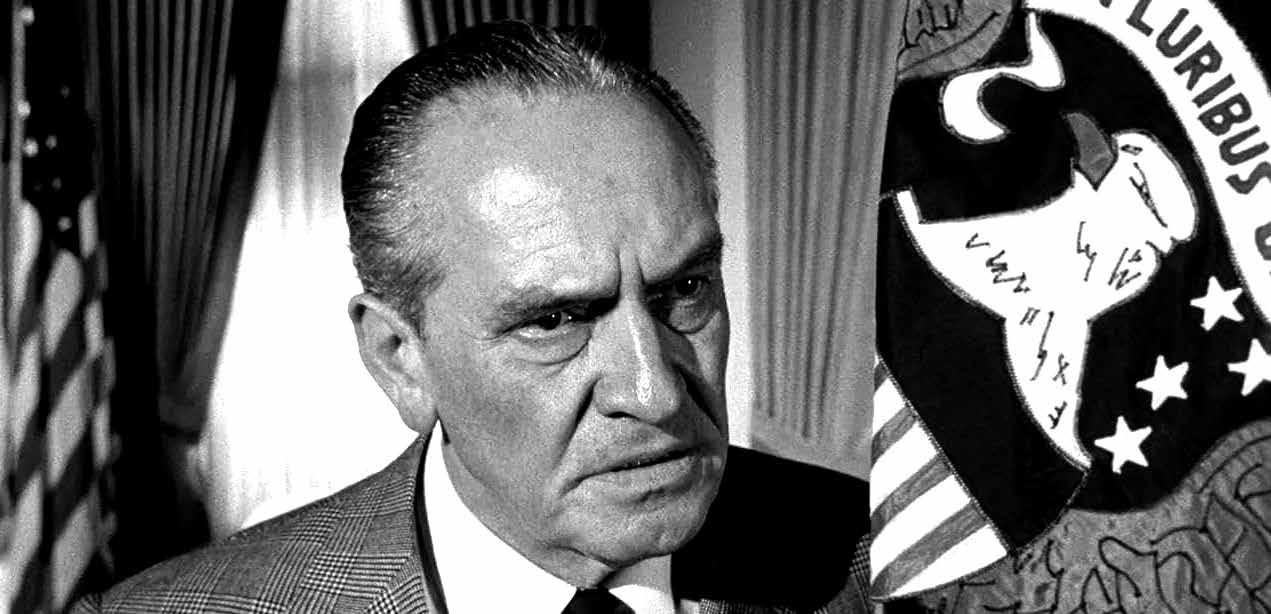
CELEBRATING 50 YEARS! FEBRUARY 23, 2024 14 SGN
SEVEN DAYS IN MAY – PARAMOUNT PICTURES
FILM
Freewheeling Drive-Away Dolls hits the road to comedic euphoria
 BY SARA MICHELLE FETTERS SGN STAFF WRITER
BY SARA MICHELLE FETTERS SGN STAFF WRITER
DRIVE-AWAY DOLLS
Theaters
Like many young filmmakers in the 1970s, Jonathan Demme got his start working with Roger Corman on a string of lowbudget exploitation endeavors, most notably the mother of all “women in prison” flicks, 1974’s Caged Heat. In the 1960s and ’70s, Russ Meyer burst upon the scene with a string
of sensationalistic, female-driven concoctions, including all-timers like 1965’s Faster, Pussycat! Kill! Kill! And 1970’s Beyond the Valley of the Dolls (written by Roger Ebert, no less). And don’t get me started on Doris Wishman. Her crazed filmography of sex, feminism, gender, and melodramatic excess (stretching from 1961 to 2007) is a wondrously disturbing sight indeed. With Drive-Away Dolls, Academy Award–winning filmmaker Ethan Coen (working with his wife and frequent editor Tricia Cooke) has delivered an absurdist,
Fool around, be Queer, have fun
Talking Drive-Away Dolls with Tricia Cooke
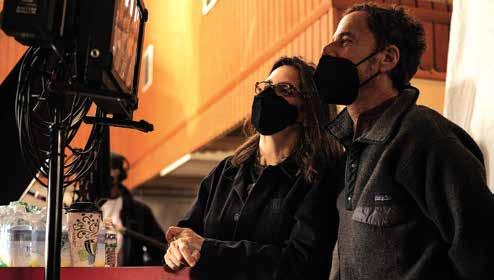 BY SARA MICHELLE FETTERS SGN STAFF WRITER
BY SARA MICHELLE FETTERS SGN STAFF WRITER
Drive-Away Dolls — a freewheeling, deadpan dark comedy set in 1999 — features Margaret Qualley and Geraldine Viswanathan as a pair of Lesbians who embark on an impromptu road trip to Tallahassee. They do not know that their drive-away rental was supposed to go to a pair of nitwit hit men (Joey Slotnick and C.J. Wilson), who have two cases hidden in the trunk intended to aid a morally corrupt Florida senator (Matt Damon) win
re-election. Bill Camp, Colman Domingo, Pedro Pascal, and a scene-stealing Beanie Feldstein fill out the remainder of the ensemble.
It’s the first film director Ethan Coen has made without his brother Joel. Although they’ve collaborated on several productions, including Barton Fink, Fargo, and O Brother, Where Art Thou?, DriveAway Dolls also marks the first official co-writing credit he’s shared with wife Tricia Cooke (the pair were married in 1993).
SEE COOKE PAGE 16
pitch-black, road-trip Lesbian comedy that would slide alongside any of Demme’s, Meyer’s, or Wishman’s more notable classics with ease. Set in 1999, it is the saga of two friends, Jamie (Margaret Qualley) and Marian (Geraldine Viswanathan), who inadvertently snag a drive-away car to Tallahassee that was originally intended for a pair of inept goons (Joey Slotnick, C.J. Wilson) in the employ of a mysterious moneyman known as “The Chief” (Colman Domingo). Things get increasingly bizarre from there.
What’s remarkable about this freewheeling lark is how it is built on a foundation of intoxicating wholesomeness. Sure, people get beaten up, shot, and even beheaded, but that never changes how agreeably charming events turn out to be. While Marian wants to get to Florida as quickly as possible, Jamie intends to hit all the backroad Lesbian hot spots in hopes of getting her best friend laid. Or, if not, at least snag a few memorable hookups for herself.
While these sex-positive aspects sound like a device more suitable for an American Pie entry or an Old School prequel, Coen and Cooke find an inherently shaggy charm in Marian and Jamie’s friendship that’s effortlessly pure. There is also an anarchic quality to their burgeoning romantic entanglement that’s reminiscent of the director’s 1987 classic Raising Arizona, and even the more dangerous aspects of the plot are laced with an intoxicating absurdist warmth.
This is primarily due to the sublime performances from Qualley and Viswanathan. The former is unhinged, bouncing around the screen with an acrobatic joviality that showcases the full extent of Jamie’s zest for life in all its boundless, unknowable curiosities. While the latter is more grounded, she brings an emotional dexterity that amazed me. Both take joy in making Coen and Cooke’s uninhibited, constantly imaginative dialogue their own, and for a film that has no problem showcasing all aspects of the human body, the sexiest moments are often conversational, and that’s largely thanks to Qualley and Viswanathan. Not every vignette or aside works. Whenever the film shifts focus to follow Slotnick and Wilson, with rare exceptions my interest noticeably waned. However, those instances when it did not are noteworthy. The first is their encounter with Jamie’s cop ex-girlfriend Sukie (Beanie Feldstein); the second is when the goons
visit a collegiate softball team that recently spent an evening playing tonsil hockey with the women they are ineptly pursuing. Both scenes are outstanding, and each showcases a type of chaotic spontaneity reminiscent of The Big Lebowski or Burn After Reading I do need to take a moment to say more about Feldstein. She pops in and out of the proceedings, and each time the whole enterprise is infused with a massive jolt of no-holds-barred electricity. Sukie is heartbroken by her breakup with Jamie. But she’s also not willing to entirely give up on her (or for that matter Marian). Feldstein is on fire, and although it’s early in the year, I feel safe proclaiming that her work is going to stick with me for all of 2024.
Drive-Away Dolls is missing the visual expressiveness of Coen’s best films, and while cinematographer Ari Wegner (The Power of the Dog) hardly drops the ball (far from it), I still missed the kinetic lyricism of Barry Sonnenfeld’s work on Raising Arizona or the sinister majesty Roger Deakins brought to A Serious Man I also wish the film had made better use of a few of its supporting players, most notably Pedro Pascal, Matt Damon, and Domingo. However, while it’s a relatively small role, Bill Camp rules as Curly, the owner of the drive-away dealership, his deadpan vocalisms a constant delight.
Mostly, though, I’m just frankly ecstatic that this movie exists. Like last year’s Bottoms or Theater Camp, or even 2022’s Fire Island or 2019’s Bit, it warms my heart to see LGBTQ+ stories that let their characters to cut loose in ways that allow them to experience happiness, community, and found-family bliss outside of their sexual or gender identities. Inherently Queer narratives can — arguably should — be as universally approachable as any other type of storytelling. Demme, Meyer, and especially Wishman all knew this, and even if they weren’t always granted the freedom to achieve this with the clarity or precision they likely desired, their intent was still rarely in doubt.
Coen and Cooke do have that creative freedom, and they take advantage of it with Drive-Away Dolls. Much like their heroines, their film blazes a trail into the unknown with intelligence, goofiness, fearlessness, and determination, and although some pit stops along the way are more memorable than others, each one still makes a lasting impression.
FEBRUARY 23, 2024 VISIT US ONLINE SGN.ORG SGN 15
DOLLS – FOCUS FEATURES
TRICIA COOKE AND ETHAN COEN ON THE SET OF DRIVE-AWAY DOLLS – FOCUS FEATURES
DRIVE-AWAY
COOKE
CONTINUED FROM PAGE 15
It is an endearingly anarchic explosion of chaos and silliness that still has a captivating pitch-black edge, and if someone told me this story was set in a universe similar to that of Raising Arizona or The Big Lebowski, I’d happily believe it.
For Cooke, who identifies as Queer, Drive-Away Dolls was a longtime labor of love she’s been wanting to make for over three decades. I sat down with the filmmaker to discuss her work on this production and what it means to her to have such a joy-filled Lesbian comedy — complete with a wall dildo — out there in the world for audiences to enjoy. Here are the edited transcripts of our brief conversation:
Sara Michelle Fetters: Where did the idea for this rambunctious, Lesbian roadtrip comedy come from? I know you came up with the original title, Drive-Away Dykes, which is honestly sublime.
Tricia Cooke: It came from the title, literally. “Drive Away.” I don’t know if you know what a drive-away is, but I had taken a drive-away car when I was in college across the country. So, I knew about [them]. I came up with the alliteration of the title Drive-Away Dykes with a friend of mine in a bar. It just sounded like a bouncy film that would be fun to make.
Later, when I was talking with Ethan about it, we were like, “That sounds like fun, but what would it be?” I wanted it to be a fun Lesbian movie. We just tried our best to come up with silly ideas or things that felt outrageous in a very innocent way to fill the movie.
SMF: To me, it felt like it was a spiritual cousin to something that Russ Meyer would’ve made during his heyday, or Jonathan Demme would’ve made with Roger Corman back in the 1970s. And yet the film still has a modern feminist spin that you didn’t see during that period, at least not with this level of directness, even though they were trying to hint at somewhat similar sentiments. Was that the idea?
TC: Yes. The idea was to harken back to those Russ Meyer, Faster, Pussycat! Kill! Kill! days, or Doris Wishman’s films, like Bad Girls Go to Hell. I wanted there to be references to Bella Abzug and Alice B. Toklas, but those were cut out of the movie. But there’s a reference to Stonewall at one point, so those things are there, and that was very important.
Yet we wanted it to be sexy too, but not exploitative. And [in] those movies certainly, and Russ Meyer’s particularly, it was all about the boobs and the sex and the violence. We wanted this to feel sexy, but not feel like we were taking advantage of the female body.
SMF: I think that’s part of the genius of casting Margaret and Geraldine. Sure, there’s some nudity. Yes, you have sex scenes. But they make it sexy by their energy, by their vibe, and by how they relate to one another. I kind of hate to put it this way, but they almost make love with the dialogue. What was that like for you, watching them embrace this absurdity in such a fiery, confidently sexy way?
TC: It was so much fun. I originally wrote this in my thirties, but I’m not in my thirties anymore, and to see two women, Margaret and Geraldine — I think both were 28 or something when we made the movie — have that youthful energy and just enthusiasm? They were both so excited, and both can be very sexual.
Sometimes you hear dialogue and you’re like, “No, that’s not how I heard it in my head.” But everything they did with the dialogue really worked, even if it was something that I hadn’t imagined. It was tons of fun to see them, to hear Geraldine say, “I want to make love with the senator’s penis.” That’s a really absurd, silly line, especially out of context, and she just, with relish, dove right in. She’s very funny, Geraldine. She is a true comedian.

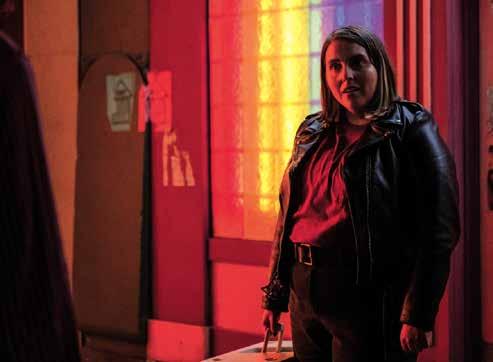
SMF: You have spent so much time, obviously, working closely with Ethan and building this incredible body of work, so you’re no stranger to the complexities of the various worlds that he and his brother Joel have created over the decades. And you’ve been a big part of that. But this is a different creative collaboration for the two of you, I think it’s safe to say. What was that like: moving more into the writing role and assisting with the directing of the picture? Was there a difference to your partnership on this film?
TC: We had written together before. … We had written another of this kind of Lesbian B-movie, and we’d written a short together. So, we had done that before. We’d also gotten together on many of [Joel and Ethan’s] movies. I’m not sure if there was a difference on that front.
When we are writing, there are certain characters that Ethan will always gravitate toward, like the two goons in the car, Arliss and Flint, and those were really fun guys. But it was important for me to say, “Okay, well, if we have them, then we have to juxtapose them with two very strong, empowered women.” Playing around with characters and situations like that was really fun, and we had never done that before. That was new.
And then directing. It was a little daunting. I’d never done it on such a large scale. But Ethan made it very easy. He was very respectful. We respect each other’s opinions and tastes, and we have a very easy way of communicating. Making those directorial choices, he was always very
open and collaborative, especially around the Queer world, which he doesn’t know.
I did have to fight to get the go-go dancer in — that was something that just was not at his comfort level. [laughs] I was like, “No, we need this here.” I was pretty firm. But for the most part, we pretty much agreed on almost everything. And it’s just fun, working with Ethan. It’s fun to have a partner to collaborate with on such a large scale.
SMF: In my head, I imagined Curly was an Ethan character and Sukie was your character. In some ways, I feel like they are kind of the hidden backbones of the entire film.
TC: They are. We often called Curly the “center of the universe” of the movie. [laughs]
I would say that all of the characters we came up with together. I would say that, for me, the Arliss and Flint characters are more of a representation of Ethan’s sensibility, and Marian and Jamie are mine. Curly kind of came from both of us, but Marian and Jamie more for me.
Sukie, I just wanted someone who could just beat the crap out of people but also someone who would play around with the sex toys. That was really fun. I wanted someone who could be an equal partner to Jamie, because she’s such a force of nature. But also someone who would have a wall dildo.
SMF: I think it’s important to have that voice in there that’s willing to call out everybody on their bullcrap. She does that, even when she ends up being wrong about what’s going on.
But she still sees the truth in things. You needed someone who had that energy and could keep Marian and Jamie in check.
TC: Definitely. To call everyone out on their bullshit is the perfect way to put it. And Beanie embraced that. She just knew exactly why she was there, why she was screaming at the thug in the jail, or why she was beating the crap out of C.J. Wilson. She knew her place in the story.
SMF: Not to get too serious on us, but I do think films like this, like last year’s Bottoms, like Theater Camp, are important. Not every LGBTQ+ film has to be about trauma. They can be fun. They can be weird. They can have wall dildos. I look at these last couple of years and see these hugely enjoyable Queer films, and it makes me smile. Are they important? More importantly, why do you think they are happening now?
TC: I agree. I think they’re really important. When we wrote this movie, that was the impetus. It was like, let’s make a movie that isn’t tragic, especially about the Lesbian community. We rarely get something that is lighthearted.
For me, it’s important, because it’s hard to be Queer. It’s hard to be in a marginalized community. They’re taking all of our rights away. So, it’s important to have coming-out movies and the serious movies too, but it’s really nice to say it’s fun to be a Lesbian or to be Queer. We have joy too, and we can celebrate. There are so many reasons that we have a community, and we need to celebrate each other in that community.
It’s often hard to relate to straight movies. So, to have movies where there’s Queer people having fun, or [in which] their queerness isn’t the entire story? Seeing them have these relationships? We don’t get enough of that. It’s hard out there right now, so it’s nice to have a break. We wanted a Queer story that could give people that.
SMF: For audiences, whether they’re Queer, straight, whatever, what do you want them to take away from Drive-Away Dolls? What do you want them to be talking about as they exit the theater?
TC: How high the wall dildo should be when they buy it from the Pleasure Chest. [laughs]
I hope that they’re talking about just some kind of fun, lighthearted pleasure, sexual pleasure, consensual, but something where you can think, “I’m going to go home and fool around and have fun.”
I hope that there’s a playfulness that people find in the movie, and that that at least can take them through the end of the night.
CELEBRATING 50 YEARS! FEBRUARY 23, 2024 16 SGN
FILM
DRIVE-AWAY DOLLS – FOCUS FEATURES
2024 Seattle Jewish Film Festival preview
Ten questions with Festival Director Pamela Lavitt
BY SARA MICHELLE FETTERS SGN STAFF WRITER
The 29th annual Seattle Jewish Film Festival (SJFF) kicks off on Saturday, March 2, at downtown Seattle’s Pacific Place Cinema with a gala screening of the award-winning drama One Love, starring Anthony Hopkins, complete with pre-show music, dancing, truffle popcorn, and mocktails. It concludes Sunday, March 17, at the Stroum Jewish Community Center with the silent feature The Man Without a World, coupled with a live score composed and performed by worldrenowned klezmer violinist Alicia Svigals and silent film pianist Donald Sosin.
I asked longtime SJCC Director of Arts + Ideas and Festivals Pamela Lavitt a series of ten questions about this year’s SJFF. Here’s what she had to say:
Sara Michelle Fetters: We’re back! It’s time for the 29th annual Seattle Jewish Film Festival! With a little over a week before you kick things off, how are feeling right now? What’s the excitement level?
Pamela Lavitt: We are excited about how the festival theme, “Lights, Camera, Community!,” selected last spring, reflects the Stroum Jewish Community Center’s mission of offering profound experiences that amplify Jewish life and culture for everyone and every generation. It also speaks aspirationally and inspirationally to the need people have for deeper connection and community.
In addition to two full weeks of cinema, SJFF offers more wrap-around engagement programming this year, with food, fanfare, and opportunities for socializing and conversation, such as our first Red Carpet Oscars Party.
Opening Night kicks off with a DJ plus dancing before the film. Brunch serves up Jewish comfort food [from] Hey Bagel! and klezmer music before the show. Each Midday Matinee includes “cinenoshes,” and Closing Night features a silent film with a live score performed by world-renowned violinist Alicia Svigals, a founder of the Grammy-winning Klezmatics, and celebrated silent film pianist Donald Sosin.
SJFF lights up theaters and in homes. It turns camera lenses on nuanced stories of local and global Jewish life and culture to strengthen community. In the best and worst of times, community is what lifts us up and keeps us connected and in conversation.
SMF: This festival is being held in the shadow of the events of October 7. Antisemitism in the United States has reached unprecedented levels. There are those who look at what is happening in Israel and Palestine and are horrified. How hard is it to prepare, staff, and plan a film festival that, at its core, is a celebration of community, artistic achievement, and humanity with all of this going on in the background?
PL: While I can’t address the geopolitical questions, as the festival’s artistic director, I can share that our curation process began in spring 2023, so all of the films submitted and considered predate the current moment and climate.
In keeping with SJFF’s goal to showcase the vibrancy and diversity of global Jewish life through independent, international cinema, this year’s festival features 18 film programs from around the world — Hungary, India, Mexico, Poland, Israel, Italy, the UK, and more.
The Stroum Jewish Community Center — and by extension SJFF — is focused on our mission to be the most open and welcoming community-centered Jewish organization in the Puget Sound region. We are proud to be a gathering place for our community to engage with one another and build profound connections.

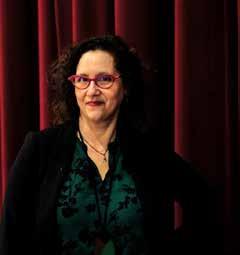
As a capstone public program of SJCC, SJFF’s mandate is to also focus on our local community, highlighting our region’s unique Sephardic Jewish community (Judeo-Spanish-speaking Jews from Turkey, Rhodes, and Greece who trace their roots to the Spanish Expulsion).
Other spotlights, like our annual Gay Gezunt! LGBTQ+ films; Call Me Dancer, about a Mumbai break dancer and his Israeli ballet teacher; and Rabbi on the Block , about a Black Jewish rabbi and activist, are all programmed to build connections, not to focus on what divides us. Yes, we are living through tumultuous times, with a 400% increase in antisemitic incidents nationally and locally (according to the ADL), which makes this film festival more important than ever as a result.
SMF: For you personally, and for everyone you work with at the SJCC, what has this period been like, balancing current events with preparing the festival?
PL: SJFF’s goal is to build connections, illuminate perspectives, increase understanding, and offer experiences that amplify profound Jewish experiences for everyone. We are focused on bringing our community together for another year of amazing Jewish film and togetherness. Community lifts us up and holds us together. People want and need to feel connected and celebrate the nuance and diversity of Jewish life, history, and culture locally and globally. It takes a lot of planning and effort to prepare for the festival, and deliver much-needed joy and films with a broad lens on Jewish life and culture.

SMF: Let’s turn back to this year’s lineup, and once again, you’ve all done a spectacular job crafting an engaging, thought-provoking gaggle of films spanning multiple genres. You open things with One Life, the hotly anticipated drama starring Oscar-winner Anthony Hopkins that just took home the coveted Audience Award at the 2024 Palm Springs Film Festival. With so many great selections, how difficult was programming this year? I bet you had to make some hard decisions.
PL: With almost 300 films considered, and a shortlist of 50, this year was very competitive for sure. Some obvious choices were selected, such as Avi Nesher’s latest, Monkey House, and the Moroccan women-centered drama Seven Blessings, both runaway Ophir winners (Israel’s Academy Awards), as well as crowd-pleasers such as Remembering Gene Wilder and The Catskills
Our submission process yields some hidden gems, such as The Secret Sabbath, about Hispanics in Mexico and the US tracing their Jewish roots; and Queer and Frum, part of our LGBTQ+ Spotlight. Two documentaries in the lineup, Rabbi on the Block and Vishniac, are the latest from past SJFF directors Brad Rothschild and Laura Bialis. And, although Tasveer, Seattle’s South Asian Film Festival, screened Call Me Dancer this year, we loved the film so much, we wanted to reprise it.
Honestly, the biggest challenge of programming this year was deciding what films to show in person only, virtually only, or both, and how to predict successful ticket sales based on that. Many filmmak-
ers, studios, and distributors are pulling back on virtual access, so this year, only half of our films are streaming.
We really want to remind people of the joy of experiencing films together, so we’ve curated events to encourage people to get off the couch and back into the theater, and Opening Night delivers the whole package! One Life is an outstanding film featuring an incredible cast (based on a beloved story; the documentary Nicky’s Family won SJFF’s Audience Choice Award in 2011). The evening also includes a pre-film DJand-dance party to kick off the night before being blown away by Oscar-winner Sir Anthony Hopkins’ moving performance.
SMF: Talk to me about those Gay Gezunt! selections. Why The Holy Closet? Why this year’s short selection Queer and Frum?
PL: The Holy Closet, an outstanding independent film, is a celebratory, heartfelt, and often humorous exploration of the lives of Queer Jews who are actively reshaping the landscape of Orthodoxy in Israel. Israel is known for powerful TV series (think Homeland, In Treatment, and Your Honor, all adapted for American TV). The Holy Closet was originally a series depicting seven littleknown, slice-of-life stories of observant Jews marrying, raising kids, dating, and navigating their values to carve a place for Queer families where one size doesn’t fit all. As one review wrote, “Moran Nakar’s celebratory documentary is an important study in tolerance for everyone, including Queer people,
CELEBRATING 50 YEARS! FEBRUARY 23, 2024 17 SGN
FILM
THE HOLY CLOSET – GO2FILMS
PAMELA LAVITT – SJFF
SEE SJFF PAGE 18
QUEER AND FRUM – DANCES WITH FILMS
FILM
Madame Web traps a game cast in a snare of mediocrity
BY SARA MICHELLE FETTERS SGN STAFF WRITER MADAME WEB Theaters
The Ben Affleck version of Daredevil hit screens on Valentine’s Day back in 2003, so it’s fitting that Madame Web not only is set during that particular year but also opens in theaters on the same day 21 years later. Heck, all that’s missing is a hit Evanescence song on the soundtrack.
I bring this up because Sony’s latest excursion into its Marvel Spider-Man–adjacent cinematic universe is the most second-tier, early-2000s comic book yarn that’s seen the light of day in ages, and this includes both the Venom entries and 2022’s Morbius. Director S.J. Clarkson has delivered a glossy, hyperactive jolt of colorfully unvarnished absurdity that could almost be fun if it wasn’t so poorly plotted and obnoxiously dumb. The film comes tantalizingly close to being an unintentional parody of the superhero genre, and that happy accident makes watching the resulting mess somewhat worthwhile.
What Madame Web does have going for it is that it is fairly well cast, rarely slows down, has some nice visual flourishes, and doesn’t take itself too seriously. Dakota Johnson’s seeming disdain for the material nicely fits her lead character of New York City paramedic Cassandra Webb. She brings a sharp sense of humor and a cutting wit that makes much of this nonsense tolerable. Sydney Sweeney, Isabela Merced, and Celeste O’Connor are also rather good as the teenage trio Webb protects from harm, while Adam Scott is having the time of his life as Ben Parker, a name that should be familiar to fans of everyone’s favorite wallcrawler all over the world.
Granted, the same could be said about Daredevil, and yet two decades later, that piece of goofy schlock is still considered something of a disaster, and for good reason. But one thing it undeniably has over Clarkson’s equally brain-dead slice of
SJFF
CONTINUED FROM PAGE 17
who are not immune to narrow-minded thinking. The breadth of participants in the series is impressive, and a reminder of how diverse the rainbow family is.”
Queer and Frum, on the other hand, hit home for me personally. As a student of Yiddish in NYC, this “mame loshn” [mother tongue] is both a language in which my grandparents spoke of great Jewish playwrights, novelists, and political thinkers and today one that many klezmer musicians, politicos, and Queer artists gravitate toward. In that Yiddish-speaking community were many ultra-Orthodox Jews who left the fold, some who were shunned because they were Gay.
Broadway has given us a Yiddish Lesbian love affair in Indecent, and Netflix has delivered a spate of shows about Hasidic communities — Unorthodox, One of Us, and My Unorthodox Life — that show how traumatic it is to “go off the derech [the religious path].” While limited in scope, as it does not address issues of Trans youth, for example, Queer and Frum is powerful as the only film I’ve ever seen focused on the harmful practice of Orthodox Jewish (not just Christian) conversion therapy and the legal fight that continues [against it].
SMF: You’re showing the critically lauded documentary Remembering Gene Wilder, and it feels only appropriate you’re doing so as part of a Sunday morning brunch at Pacific Place. Tell us more about this special event.
PL: This film is so freakin’ fun, a “mechaya [joy]”! As Mel Brooks says in the film, “when [Gene Wilder] got excited, he

super-powered hokum: a great villain. Two of them, actually. However, Michael Clarke Duncan as a suitably threatening Wilson Fisk and Colin Farrell as magnificently out-of-his-gourd Bullseye both deserve to be in a much, much better motion picture.
Unfortunately, I have absolutely no idea what happened with Tahar Rahim’s performance as Peruvian madman Ezekiel Sims.
Though Rahim is a sensational actor, known for his superlative turns in A Prophet, The Past, and The Mauritanian, it sounds like almost all of his dialogue was done via automated dialogue replacement (ADR), as if he were starring in some 1970s Italian spaghetti Western or giallo. His character’s motivations are never explored and rarely explained (and certainly not in any detail). Sims’s superhuman abilities seem to change whenever the plot requires them to, making him not so much a threat as a vaguely unthreatening Terminator clone.
And what is that plot? Webb is an orphan who, 30 years after her traumatic birth, suddenly gains furtive Groundhog Day–like glimpses into the future that she can’t control.
was a volcano.” Who doesn’t love a little bit of Willy Wonka, Young Frankenstein, Blazing Saddles, and Wilder’s comic genius for every generation? We are excited to feature Hey Bagel!, a new local bagel maker; a buffet of Jewish comfort food, dessert, and fixings; local Dancing Goats Coffee of Olympia; and Sholom Teas of Tacoma. The KlezKatz will jam in the theater for an hour before the show. What’s not to like?
SMF: This year’s festival is also happening at the same time as the 96th annual Academy Awards, and you’re having an Oscar party. How did this even come about? It sounds like it’s going to be a lot of fun.
PL: We are embracing the red carpet this year at last! For two years running, the Academy announced the Oscars smack in the middle of our festival’s opening weekend, and we ended screenings early. Long the provenance of Three Dollar Bill Cinema, we are hoping to make a splash with this event in our theater on Mercer Island, complete with appetizers, sangria, champagne, a gourmet popcorn bar, and ballot-winning prizes. We hope folks will get in their Hollywood best, dress up like their favorite nominee or film (Barbie? Oppenheimer?), and join us!
SMF: What are some additional under-the-radar highlights of this year’s festival you want people to be aware of?
PL: I always champion smaller, seemingly niche documentaries that may not “sell” to broader audiences but are so incredibly rewarding, marvelous, and inspiring, like Call Me Dancer (for dance lovers and fans of “against-all-odds” stories), Vishniac (for history buffs and photography fans), and this year’s shorts program, Safe Travels? You will be wowed by the selections that shorts program curator
This leads her to Julia Cornwall (Sweeney), Anya Corazon (Merced), and Mattie Franklin (O’Connor), three teens from different worlds who have been marked for assassination by a determined Sims.
Sims has been having nightmares of them growing up to be vigilante superheroes who, for reasons he does not know, break into his Manhattan skyrise abode and throw him out the window to his death. Instead of waiting for that to happen, he decides to kill them while they’re still in high school, and Webb is the only one who can stop him.
Or something like that. It honestly doesn’t matter. Simms wants to kill the girls. They don’t want to die. Webb tries to gain control of her prognostication abilities to keep him from doing it and in the process learns about how her mother (Kerry Bishé) was betrayed and then murdered while researching spiders in Peru. There’s not a great deal more to it.
The story and screenplay, credited to five different writers (including Clarkson), is all over the map. It makes playful references
Warren Etheredge has put together this year, addressing themes of displacement, relocation, and running away (or toward something). Festivals uniquely serve up short films, and film lovers should indulge in them whenever possible.
We will also screen the shorts program in person at UW, free for students, and in Walla Walla at the Gesa Power House Theatre in partnership with Movie Crush Shorts Film Festival. We’ve added a very poignant “In Memoriam” screening to that package in honor of a filmmaker who died on October 7. All of these films are available online, too. (And don’t miss the short Pickles playing with Seven Blessings, our Israeli Cinema spotlight.)
SMF: You’ve been planning, programming, and running SJFF for quite some time now. Why is this event important to you? What keeps you coming back year after year?
PL: In addition to running a theater year-round with comedians, bands, family shows, chefs, and authors as part of our SJCC Arts + Ideas season (https://sjcc. org/arts), the festival engages the largest numbers in the wider public each year who share heartening comments like these:
“I really enjoyed many of the films, and appreciate being able to learn about a culture different than mine, through cinema.
Thank you!”
“I feel it is really important for my connection to the community to have in-person movies.”
Cinema is a highly rewarding way to build understanding and community. The SJCC and SJFF are doing our part to amplify for everyone Jewish stories and connections to ensure a deeper understanding of the Holocaust, of antisemitism, of our diversity, and
to the superhero-who-shall-not-be-named (Peter Parker/Spider-Man), although as he’s nothing more than the bun in Mary Parker’s (Emma Roberts) oven, which isn’t a surprise. But the film also doesn’t do a thing to flesh out any character other than Cassandra Webb, and this includes Julia, Anya, and Mattie. Heck, if someone revealed that Sweeney, Merced, and O’Connor adlibbed all of their dialogue, I’d be tempted to believe them.
But that’s the least of the film’s structural problems. Not to be a broken record, but why is Sims the way he is? If this Peruvian spider is so well known around the world, why did no one other than Cassandra’s mother go look for it (including after her death)? If Julia, Anya, and Mattie end up being spiderpowered superheroes within a few short years, why does all of New York lose its collective crap when Spider-Man comes along after they’ve been doing their thing for probably at least a decade? What exactly are the rules regarding Webb’s abilities?
Some of these questions are important, others arguably not so much. But the fact that all (and several more) are given not so much short shrift but no shrift at all is an issue. A few implausible occurrences here and there and a small cadre of narrative shortcomings aren’t a deal breaker. But an onslaught of them? One right after the other? To the point where it becomes borderline comical? That’s too much of an ask.
Which brings us back to those not-sofondly-remembered 2000s catastrophes like Elektra, Catwoman, Fantastic Four, and the aforementioned Daredevil. There was talent involved with each from a production standpoint, they all had game casts, and the same can be said about Madame Web. But the latter falls a trap of mediocrity similar to the one they all became ensnared in, and it’s a shame Cassandra Webb didn’t see that regrettable turn of events coming, because then maybe she could have done something about it — like canceling production before it even began.
of our community. That work is never done.
On a more personal note, with my background in folklore and theater history, I love the sharing of stories and discovering which films really resonate with people on a heart level or that blow them away. Plus, getting to schmooze with filmgoers and filmmakers — digging into thoughtful conversations together — is so rewarding. I love interviewing filmmakers and hearing how they championed bringing unique, curious, and lyrical stories to the big screen, often over years of effort. So much goes into our being able to present their babies. Each SJFF gem has an incredible story behind the story.
SMF: For audiences, what do you want them to take away from this year’s SJFF?
PL: I want our greater Seattle arts and filmloving — Jewish and non-Jewish — communities to take in nuanced stories of world cinema, life, culture, and history, and find our common humanity while exploring how diverse the Jewish community is locally and globally. We’re far from being a monolithic culture: everyone is from different backgrounds, beliefs, and affinities. Jewish families come in all stripes, colors, and mixed heritages. We speak different languages. We want to go to the movies to see ourselves represented on screen and to explore our own and other diverse cultures. Cinema introduces new perspectives that enrich us all.
The Seattle Jewish Film Festival runs March 2 thru March 17 at venues throughout Seattle and via an online screening platform. Head over to https://seattlejff.org for a full calendar of screenings and events, as well as to purchase tickets and full series passes.
CELEBRATING 50 YEARS! FEBRUARY 23, 2024 18 SGN
MADAME WEB – COLUMBIA PICTURES
Parisa Akhbari’s Just Another Epic Love Poem an ode to feminine connection
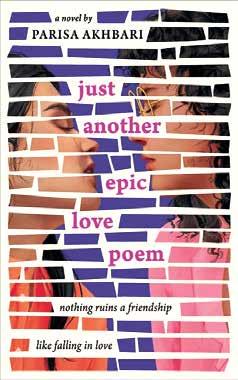 BY LINDSEY ANDERSON SGN STAFF WRITER
BY LINDSEY ANDERSON SGN STAFF WRITER
Books were Parisa Akhbari’s first love, yet the feelings were unrequited. As a Queer, Iranian-American woman, her experiences weren’t on the pages of Judy Blume novels.
“I was a voracious reader, but I didn’t see myself reflected in the books I was reading,” she said. “It wasn’t until I started reading my first Queer Iranian young adult novel, which was by Sara Farizan, that I realized that, like Toni Morrison says, ‘If there’s a book out there that you want to read but it hasn’t been written yet, then you have to be the one to write it.’ So I thought, ‘There’s a way I can use my voice and narrative to help open a door for other young people who don’t see themselves reflected.’”
Akhbari kept Morrison’s words tacked to the board in her writing room to inspire her as she completed the draft of her first novel. In 2018, she began querying agents about a story that reflected her experiences.
“The feedback we got was that the writing was lovely but that the plot, or the story itself, was a little too niche and not marketable in a commercial market,” Ahkbari recalled. “I think that’s something that marginalized creators can run into a lot, the perspective that the stories we have to tell might not translate to a broader audience, a white audience, or a straight audience. So, I decided to go back to the drawing board and figure out how to tell a story from my intersectional experience that’s also a bit bigger in concept.”
From there, she came up with her debut novel, Just Another Epic Love Poem. The book takes a multimedia approach to female friendship in the form of a continuous conversation between two best friends as they navigate Catholic school and Queer identities. The story combines poetry, prose, and modern forms of communication, such as text messages.
Bonds of connection
The love poem also follows a set of rules Akhbari came up with for her characters. “Each girl will end on a certain word, and the next girl will pick that word up and start with it,” Akhbari said. “Those were the challenges for me — how to tell their neverending-poem story without any terminal punctuation…, and then how to make their poems flow in that way with the call-andresponse of that word echoing. I like to create problems for myself and then figure out how to get out of them.”

The constant flow of communication was inspired by Akhbari’s adolescent friendships. “We would talk all the time, but we would also text, we’d talk on the phone, we’d write letters to each other, we’d write notes in class that we’d pass back and forth, we would, you know, slip little messages into each other’s lockers,” she said. “It was never like the conversation ended. Every time we would part ways, it would feel like there was a comma at the end of our conversation, and then in the next format, we would pick it up again.”
While the book is a love story between two girls, it also feels like one written about the bonds of feminine connection. The ongoing poem includes odes to inside jokes, mannerisms, and idiosyncrasies common in adolescent conversation.
“If you listen to a group of high school or middle school friends talk, you’re going to hear them echoing these inside jokes or little reverberations of each other, and so I thought that would be a fun way to capture that in poetry,” Akhbari added.
Writing her debut novel and depicting intersectional Queer Iranian-American characters put a lot of weight on Akhbari’s
“I want to do justice by the Queer [and] Iranian American community, but at the same time … this is just one story and one voice, and I hope there will be lots of many different ones [to come].”
shoulders. “I feel the pressure to get things right,” she admitted. “I’ve witnessed some marginalized authors and creators having extra scrutiny and being put on a pedestal to represent their whole group, so I feel that pressure, and I want to do justice by the Queer community and by the Iranian American community, but at the same time I am trying to give myself the freedom to say this is just one story and one voice, and I hope that there will be lots of many differ-
ent ones, and that this doesn’t have to be the example for everybody about what it means to be Queer and Iranian American — it’s just one person’s experience.”
Just Another Epic Love Poem will hit shelves on March 12. Parisa Akhbari will celebrate the release of the novel at Third Place Books in Ravenna on March 15 at 7 pm with a special reading and book signing event.
CELEBRATING 50 YEARS! FEBRUARY 23, 2024 19 SGN
BOOKS
DIAL BOOKS
PARISA AKHBARI – PHOTO BY MUQU JAVAD
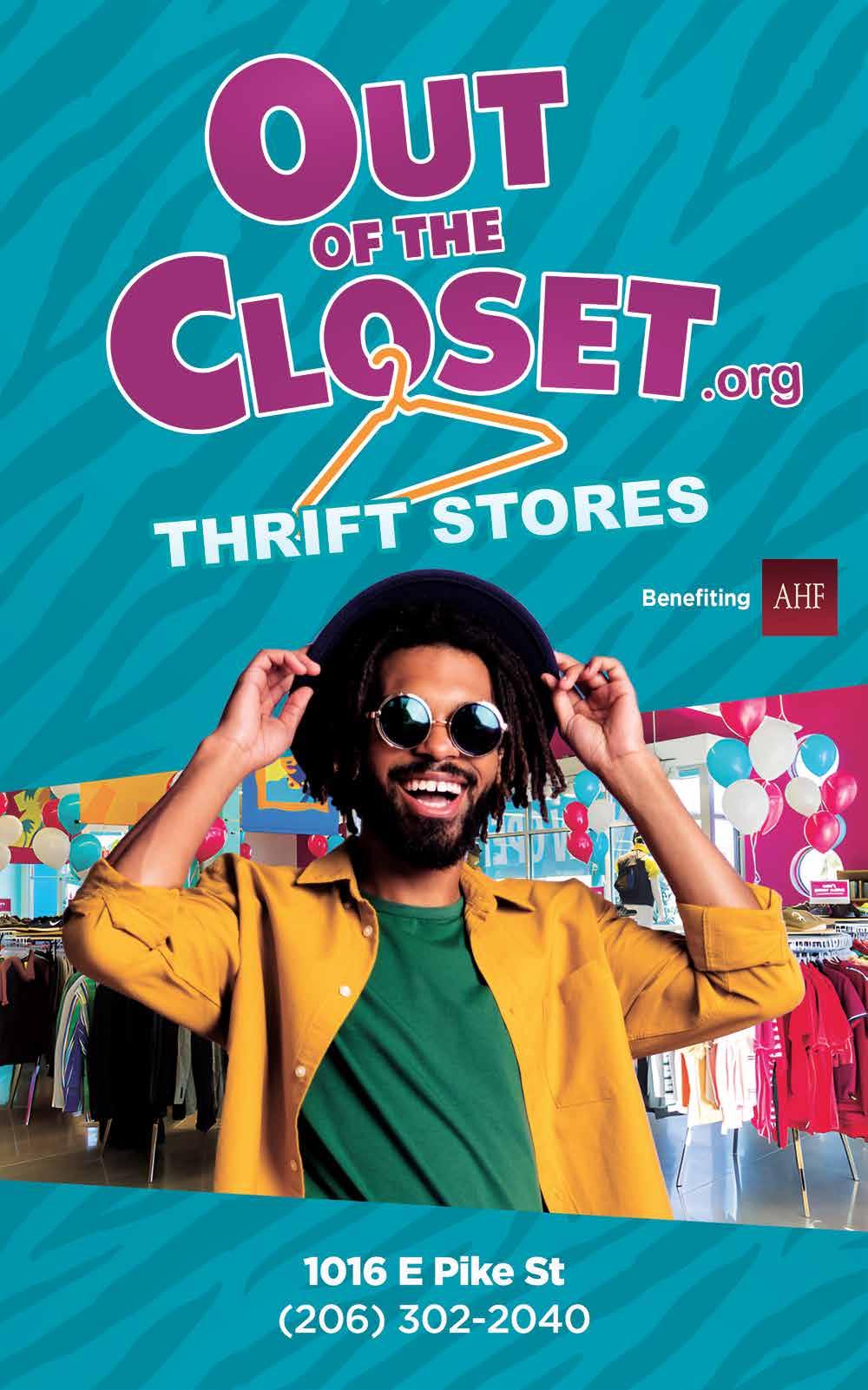


 BY LINDSEY ANDERSON SGN
BY LINDSEY ANDERSON SGN

































 BY IAN CROWLEY SGN CONTRIBUTING WRITER
BY IAN CROWLEY SGN CONTRIBUTING WRITER





 BY SHELBY OLSON SGN CONTRIBUTING WRITER
BY SHELBY OLSON SGN CONTRIBUTING WRITER
 BY SARA MICHELLE FETTERS SGN STAFF WRITER
BY SARA MICHELLE FETTERS SGN STAFF WRITER

 BY SARA MICHELLE FETTERS SGN STAFF WRITER
BY SARA MICHELLE FETTERS SGN STAFF WRITER
 BY SARA MICHELLE FETTERS SGN STAFF WRITER
BY SARA MICHELLE FETTERS SGN STAFF WRITER






 BY LINDSEY ANDERSON SGN STAFF WRITER
BY LINDSEY ANDERSON SGN STAFF WRITER

